
SPRING 2024 IN THIS ISSUE Articulation Agreements to Graduate School. PAGE 11 Forging Bright Futures Beyond Prison. PAGE 21 Awards Honor Alumni Trail Blazers. PAGE 32 Chaminade Magazine
BOARD of REGENTS BOARD of GOVERNORS
CHANCELLOR
Rev. Oscar Vasquez, S.M.
CHAIR
Keiki-Pua S. Dancil, Ph.D.
FIRST VICE CHAIR
Rodney Harano, M.B.A. ’84
SECOND VICE CHAIR
John Field, Jr., MBA ’84
SECRETARY
Karen Knudsen
Violeta A. Arnobit
Gae Bergquist-Trommald
Carolyn Berry Wilson
Ismael Eustaquio, Jr. ’88
Lori Forman, Ph.D.
Eric Fujimoto, M.B.A. ’94
Melialani P. James
Estelle Kelley, J.D.-M.B.A., Ph.D.
Lydia Park Luis
Bro. Joseph Markel, S.M.
Bennette E. Misalucha
Jean E. Rolles, MSJBS ’93
Lance A. Mizumoto, M.B.A. ’92
Alison Tanaka, M.B.A. ’15
David Underriner
Bro. Edward A. Violett, S.M., Ph.D.
Terrence L. Walsh, Jr. ’93
Jeannine M. Wiercinski
EX OFFICIO
Lynn M. Babington, Ph.D.
David Carter, Ph.D.
Col. Christine M. Gayagas (Ret.), Ed.D.
Bro. Jesse O’Neill, S.M.
Rev. Oscar Vasquez, S.M.
EMERITUS
Gary E. Liebl, L.H.D.
CHAIR
Col. Christine M. Gayagas (Ret.), Ed.D.
VICE CHAIR
Anton Krucky
SECRETARY
Blaine Rand Y. Lesnik, Psy.D.
Arnold M. Baptiste, Jr.
Richard J. Blangiardi
John C. Brogan
Margery S. Bronster, Esq.
Sai Cheong Chui ’76, M.B.A. ’78
Bob Eisiminger
William H. Garrett
Robert S. Harrison
Warren H. Haruki
Gary G. Hogan
Matthew D. Howard ’89
Michael F. Kerr, J.D.
Lung-Nien Lee ’88
Dawn O. MacNaughton, M.B.A. ’93
RADM Joseph J. McClelland, Jr. (Ret.)
Matthew Morgan, M.Ed. ‘02
RADM Kenneth P. Moritsugu, M.D., M.P.H., F.A.C.P.M., USPHS (Ret.)
Donald D. Rodrigues
Richard E. Tanaka
Vaughn Vasconcellos
LTG Francis J. Wiercinski, USA (Ret.)
Albert Wong
EX OFFICIO
Lynn M. Babington, Ph.D.
Keiki-Pua S. Dancil, Ph.D.
LEADERSHIP
PRESIDENT
Lynn M. Babington, Ph.D.
PROVOST & SENIOR VICE PRESIDENT OF ACADEMIC AFFAIRS
Lance Askildson, Ph.D.
SENIOR VICE PRESIDENT & CHIEF FINANCIAL OFFICER
Aulani Kaanoi
RECTOR & VICE PRESIDENT FOR MISSION
Bro. Edward Brink, S.M.
VICE PRESIDENT FOR ENROLLMENT MANAGEMENT & ASSOCIATE PROVOST FOR STUDENT SUCCESS
Jennifer Creech
VICE PRESIDENT, UNIVERSITY COMMUNICATIONS & MARKETING
Lisa Furuta
VICE PRESIDENT, ADVANCEMENT
Jill Higashi
VICE PRESIDENT, STUDENT AFFAIRS & DEAN OF STUDENTS
Allison Jerome


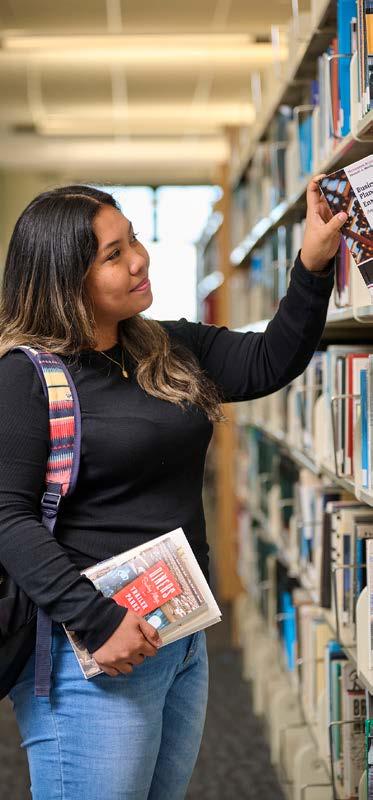

“In an era marked by expanding globalization and digital connectivity, our magazine serves as a unifying force.”
Aloha,
As you leaf through this issue, you will see that Chaminade Magazine is more than just a publication; this is a testament to the vibrancy of our academic community and the transformative power of ideas. It reflects our unyielding commitment to excellence, inclusivity and strategic foresight, which have elevated our institution to new heights, reinforcing our position as a beacon of knowledge and enlightenment.
In an era marked by expanding globalization and digital connectivity, our magazine serves as a unifying force, connecting individuals across disciplines, generations and geographical boundaries. Through compelling stories, thought-provoking articles and engaging features, we aim to cultivate a sense of belonging and camaraderie among our readers, fostering meaningful connections that endure beyond the pages.
Chaminade Magazine further showcases our outstanding achievements, inspiring programs and community-first initiatives, such as the Hawai‘i Guarantee matching-tuition promise, Mu‘o Scholarship partnership with Kamehameha Schools and the Higher Education in Prison program that aims to reduce recidivism and advocates for a rehabilitation-through-education narrative.
Among the pages, you will also learn about the noteworthy accomplishments of our faculty, students and alumni, including Kaua‘i Mayor Derek Kawakami ’01, interior designer Avery Solmsson ’03 and Tina Andrade ’05 MPT ’14, Chief Operations Officer of Catholic Charities Hawai‘i. We strive to celebrate the diverse talents and contributions within our University community, inspiring others to soar to greater levels of excellence.
At the heart of our University’s Catholic Marianist mission is the pursuit of knowledge, justice, integrity and the advancement of society through critical inquiry and innovation. Our stories serve as a catalyst for intellectual curiosity, sparking dialogue, debate and reflection on pressing issues facing our world today. By showcasing groundbreaking programs, insightful commentary and visionary ideas, we aspire to inspire readers to question, explore and engage with the complexities of the world around them.
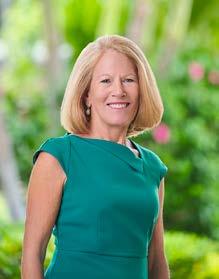
Thank you for your continued support and enthusiasm for Chaminade Magazine. Together, let us continue to connect and innovate as we shape the future of our institution and make a lasting impact on the world.
Lynn Babington, Ph.D. President
Chaminade Magazine
Chaminade Magazine is produced and published by:
Chaminade University of Honolulu University Communications and Marketing 3140 Wai'alae Avenue, Honolulu, HI 96816
EDITORIAL
Editor: Cathy Lee Chong
Assistant Editor/Writer: Simplicio Paragas
CREATIVE
Designer: Joy Oshiro
Photographer: Ren Tachino, Tommy Shih, Mitch Matsuura, and Jerome Osurman
EDITORIAL COMMITTEE
Dr. Lance Askildson, Senior Vice President and Provost; Jennifer Creech, Vice President Enrollment Management and Student Success; Cathy Lee Chong, Assistant Vice President Communications; Lisa Furuta, Vice President Communications and Marketing; Jill Higashi, Vice President Advancement; Simplicio Paragas, Writer
Copyright 2024 Chaminade University of Honolulu. All rights reserved.
Website: chaminade.edu/publications
Email: ucm@chaminade.edu
Send Class Notes to: alumni@chaminade.edu

On the cover: Kaua‘i Mayor Derek Kawakami ’01 credits his leadership success to values instilled as a student at Chaminade University. Read his story on page 16.
THIS PAPER STOCK HAS BEEN INDEPENDENTLY CERTIFIED TO FSC® STANDARDS. ALSO THE INKS SELECTED FOR THIS ISSUE ARE RENEWABLE VEGETABLE-BASED INKS. FPO (replace)
chaminade_univ
ChaminadeUniversity ChaminadeUniversity ChaminadeUniversity chaminade.edu
4 | CHAMINADE MAGAZINE
Page 16 Greatness
Derek Kawakami ’01 fulfills his destiny.
Page 24 Art House
Interior Designer and Innovator Avery Solmsson Reflects Hawaiian values.
Page 37 Silversword Strong Reunions bring alumni back to Kalaepōhaku.
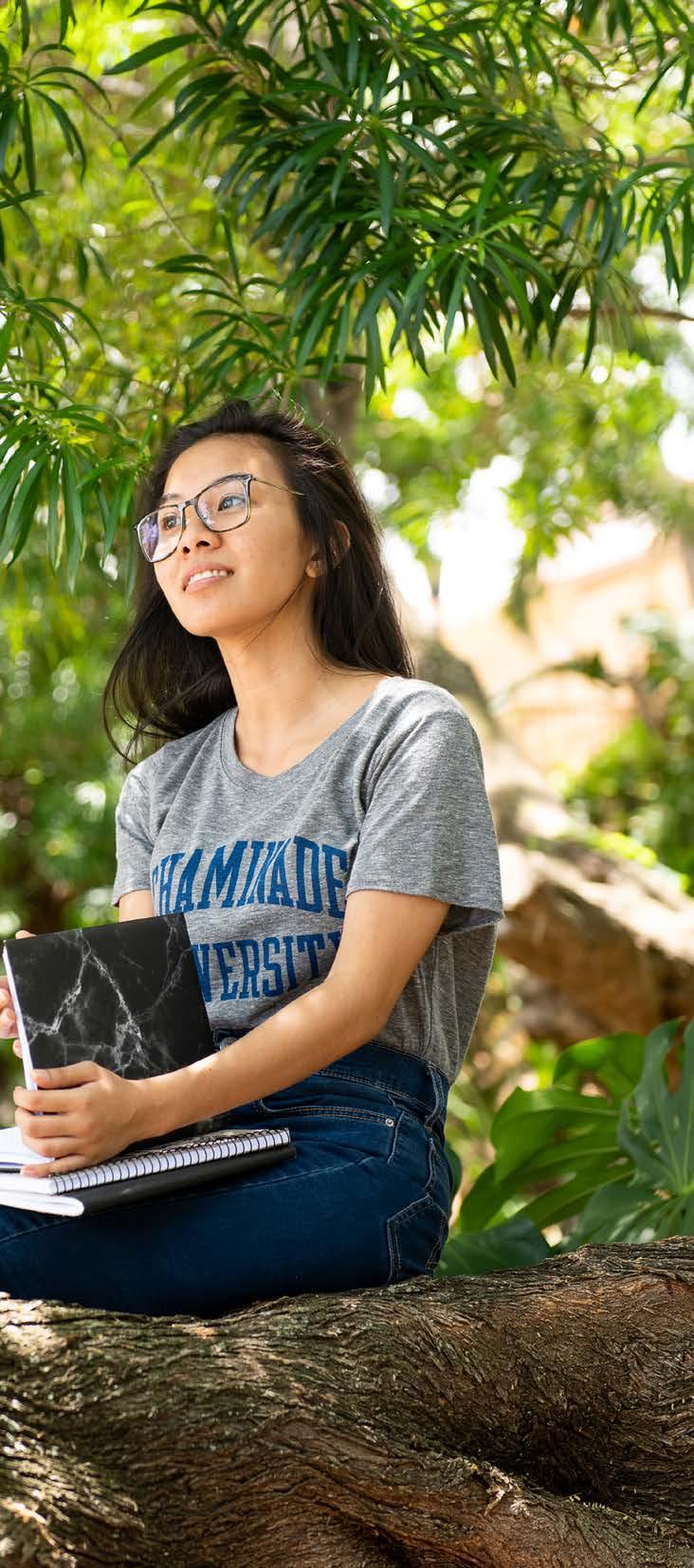
VIEW FROM THE HILL
6 What Makes University Education Marianist?
8 The Benefits of Early College
10 Mu‘o Scholarships: Filling the Teacher Shortage
11 Articulation Agreements
Open Doors
12 Chaminade’s Hawai‘i Guarantee
14 Ensuring Student Success
TAKING THE LEAD
16 Destined for Greatness: Derek Kawakami ’01
19 The Everlasting Marlene Baker
20 Heritage Awards
21 Bright Futures Beyond Prison
24 Designing Woman: Avery Solmssen ’03
CHANGE MAKERS
27 Catholic Charities Hawai‘i
28 Silversword Spotlights
30 Artificial Intelligence In Education
32 Alumni Awards and Hall of Fame
CLASS NOTES
37 Silversword Reunion
38 Class Notes OUT & ABOUT 42 Notables 43 Scene & Heard
FEATURES
SPRING 2023 | 5
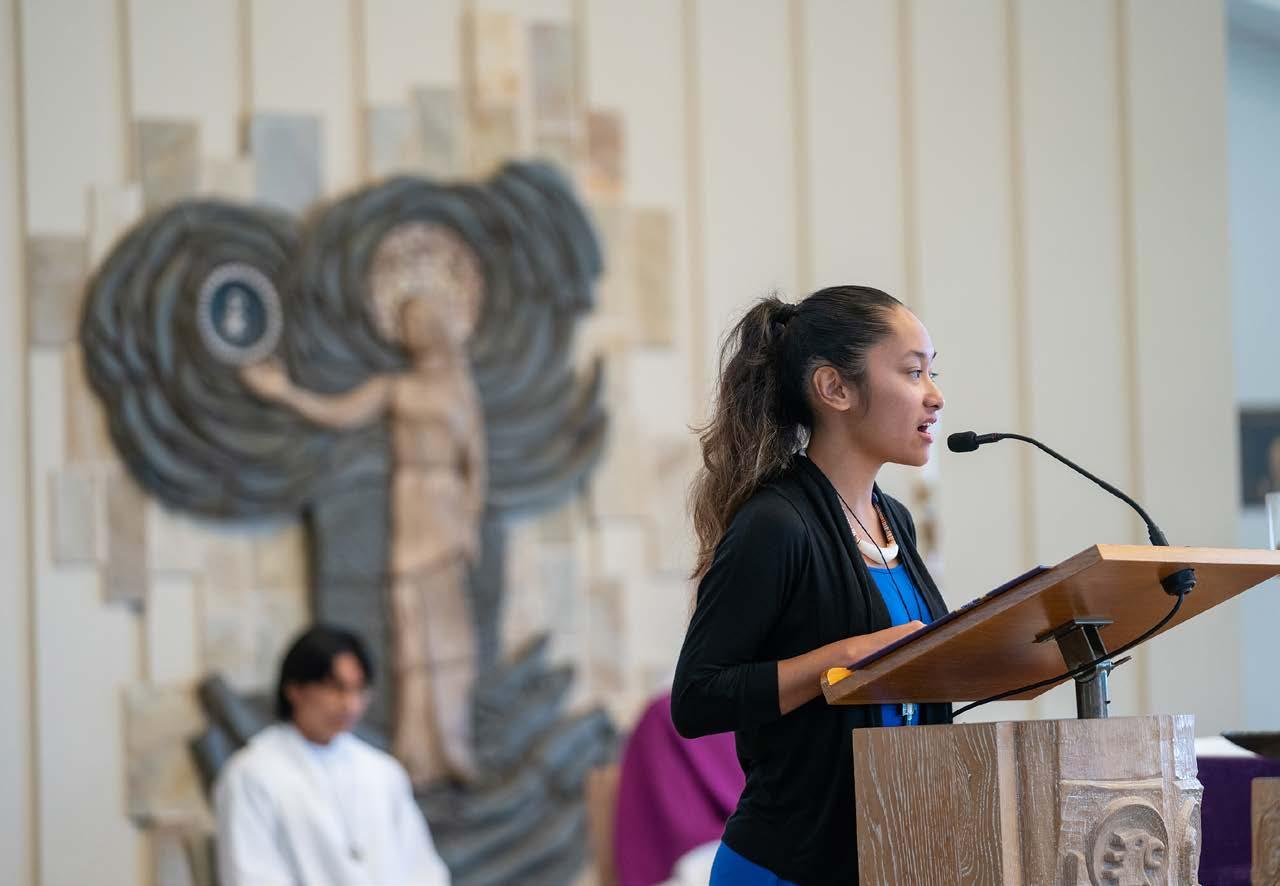
Association of Marianist Universities
In his seminal book, “A New Fulcrum: Marianist Horizons Today,” the late Fr. David Fleming posed: “What Makes University Education ‘Marianist’?” One of the potential answers perhaps lies in the synthesis of faith and reason, a hallmark of Catholic and Marianist education. It’s about fostering a community of learners who not only excel academically, but who also grow spiritually, morally and ethically. It’s about instilling in students a deep sense of social responsibility and a commitment to making the world a better place.
“In terms of the relationship between faith and reason, I adhere to Pope John Paul II’s 1998 Encyclical Letter ‘Fides Et Ratio,”’ in which he describes Faith and Reason as two wings on which the human spirit rises to the contemplation of truth,” answered Chaminade President Dr. Lynn Babington, when asked about her understanding of the relationship between faith and reason in an interview with the Association of Catholic Colleges and Universities. “In other words, the Catholic intellectual tradition at the heart of a Catholic university presupposes the
harmonious existence between faith and reason. It’s a relationship that is not static because both faith and reason are involved in a mutual search for and reception of meaning and truth.”
For Association of Marianist Universities (AMU) Executive Director Bro. Thomas Giardino, Fleming’s question could serve as a catalyst for conversations that are needed today in order to develop and advance the mission and identity of Marianist and Catholic higher education.
“Since the Marianist educational tradition is a person-centered charism
6 | CHAMINADE MAGAZINE
[gift] with a mission strategy, when this reality is felt by students, staff and faculty then that university education is alive with the Marianist sensibilities,” said Giardino in an email response. “This means that the university community experiences that they individually matter, that relationships matter, that the world matters, and that there is a relationship between their education and their encounter with our world. For this to happen, there needs to be a critical mass of persons who are in the community, not simply for transactional relationships, but for transformational relationships; that is, it touches the meaning and purpose of their identity, what they live for.”
In today's society, where knowledge is abundant but wisdom is scarce, Catholic and Marianist universities face pressing issues. One such concern is the challenge of maintaining their distinct identity and values in a rapidly changing world. The secularization of higher education and the

prevailing culture of individualism pose threats to the unique mission of these universities.
Another pressing matter is the need for inclusivity and diversity. As society becomes more pluralistic, Catholic and Marianist universities must ensure that their campuses are welcoming to people of all backgrounds and faiths. They should strive to create an environment where open dialogue and respectful exchange of ideas can flourish.
AMU plays a crucial role in addressing these challenges. It serves as a platform for collaboration and shared learning among Catholic and Marianist universities. It fosters a sense of solidarity and unity among these institutions, helping them preserve their core values while adapting to the demands of the modern world.
“The Association of Marianist Universities provides a structure for the three Marianist Universities to share ideas and programming to strengthen the Marianist identity of each of the universities,” said Bro. Ed Brink, Chaminade’s Vice President of Mission and Rector. “Through the work of AMU, there are regular meetings (usually via Zoom) of people from each of the universities that have similar jobs.”
In 2005, members from Chaminade University, University of Dayton and St. Mary’s University of San Antonio responded to the call from the AMU Board to build a partnership among members of the Society of Mary, the sponsoring religious body. It would invite a cadre of lay collaborators, who would together sustain and renew the mission and identity that was Catholic, and that embodied the Marianist educational tradition.
Since then, faculty, staff and administrators have been invited each year to deepen their understanding of and their commitment to the traditions and beliefs that make each respective university a Catholic and Marianist community.
“In the summer of 2022, AMU held a symposium during which more than 100 people from the three universities gathered to reflect on the unique contribution Marianist Universities make to American higher education and to
Catholic and Marianist universities must ensure that their campuses are welcoming to people of all backgrounds and faiths. They should strive to create an environment where open dialogue and respectful exchange of ideas can flourish.
envision possibilities for the future,” Brink said. “Whenever AMU gathers people from the three universities together, we are reminded that we are part of a bigger mission. While we all take pride in our own work, we are able to see that we are working on a project that goes well beyond our own institution and campus walls.”
In a world marked by division and polarization, the three Marianist/Catholic universities promote a message of unity and common purpose. They produce graduates who are not only academically competent but also compassionate, ethical and dedicated to making a positive impact on society.
In a world hungry for meaning and purpose, the Association of Marianist Universities serves as a guiding light. It reminds us that education is not just about acquiring knowledge; it's about becoming better human beings. It underscores the enduring relevance of Catholic and Marianist principles in today's society, where the search for truth, goodness and justice remains as vital as ever.
“Our faculty and staff already embrace and appreciate the values of providing a quality education, and an education for service, justice, peace, adaptation and change,” Babington said. “They may not necessarily have a religious affiliation, but they do believe in an equal and just society, which is what we impart to our students.”
VIEW FROM THE HILL | 7
JUMP START TO COLLEGE

For the past two years, Kapa‘a High School seniors, Tatum Harper and Taeani Largusa, have taken several synchronous online courses with Chaminade University professors, earning college credit while simultaneously fulfilling their high school requirements. The hours of studying and discipline paid off. Learning she just got into Columbia University, Harper was ecstatic.
“It’s my dream school,” said Harper, during Chaminade’s inaugural Early College Summit, which was attended by a mix of 70 students from Kapa‘a High School, Sacred Hearts Academy and Saint Louis School. “Participating in this program has really prepared me for college.”
Largusa echoed the same sentiment, adding that she expects to hear from Syracuse University soon. “When I took the virtual campus tour I fell in love with it,” says the first generation, soon- tobe-college student. “This program has given me confidence in knowing that I can handle the demand of college courses.”
Early college programs can provide several benefits, including the opportunity for students to accelerate their education, which can lead to the completion of college degrees at an earlier age. There’s also the perk of cost savings, reducing tuition costs for future higher education.
Sacred Hearts Academy counselors Ashley Luke and Sharlene Chock both agreed that Chaminade’s early college program will help students become familiar with the expectations and rigor of college-level coursework, easing their transition to full-time college later on.
“Some struggled initially with the transition because of the extra studies involved in taking college-level courses,” said Luke, who counsels 10th and 11th graders. “Even our top students were stretched because they didn’t understand process versus perfection, which they’re used to achieving in high school.”
With this first cohort of 17 Lancers, Chock believes the college exposure will help them navigate the waters of post-secondary education. “They have already been individually challenged,” said the 12th grade counselor. “I think the experience shows them that college is attainable.”
Saint Louis School students Landon Dimaya, Cash Acorda and Kevin Simmons will begin their college courses next semester. The three Crusaders cited
ABOVE: Chaminade student
Joleigh Ballesteros-Magdaro, far right, serves as a mentor to Kapa‘a students.
8 | CHAMINADE MAGAZINE

LEFT: High school students in the Early College Program at Chaminade spent a day on campus, meeting teachers and learning more about how to earn college credit to get a jumpstart on college.
“This program is such a great opportunity for these high school students to earn dual credits. And it gives them that real college experience."
Kim Baxter Early College Director
different reasons for participating in the program. Dimaya is a fraternal twin whose sister Lindsey is already a Sacred Hearts Academy participant. “I want to reduce the financial burden on my parents,” he said. “It would be really expensive to have to pay tuition for me and my sister at the same time.”
“I want to get ahead,” offered Acorda, who plans to apply to Stanford, with
Simmons further noting that the experience would look good on his application.
Research demonstrates that early college programs show strong and lasting evidence of effectiveness for all students. It promotes both post-secondary access and success. The data is undeniable that students who participate in such programs will be ahead of their peers and graduate from a four-year university either debtfree or with very little federal student loan debt. The latest data from the American Institutes of Research further supports the claim that students who participate in these programs are better prepared to transfer to a four-year university than students who attend the university without prior college experience.
Moreover, encouraging students to attend college improves individuals’ earnings over a career, increases the amount of taxes the government collects, and reduces government spending on federal assistance programs.
“This program is such a great opportunity for these high school students to earn dual credits,” said Kim Baxter, Chaminade’s Early College Director. “And it gives them that real college experience.”
 BELOW: Students from Sacred Hearts Academy toured campus.
BELOW: Students from Sacred Hearts Academy toured campus.
VIEW FROM THE HILL | 9

Mu‘o Scholarships
TO FILL THE TEACHER SHORTAGE
Nagem Uiagalelei ’28 is in the first cohort of students who earned Mu‘o Scholarships to earn a bachelor’s degree in education to become a teacher. She balances being a mother to a three-yearold son and working part time, with a full load of online courses. Yet, she is thankful for the scholarship that comes from the partnership between Kamehameha Schools and Chaminade University.
Mu’o means to bud, and the Mu’o Program will help to grow teachers, to bud teachers who will positively impact our communities through their teaching careers for generations to come.
There is a critical need for early education, primary and secondary teachers in Hawai‘i and across the nation. This shortage of educators has led to an innovative and community-focused teacher prep partnership between Chaminade University and Kamehameha Schools to provide 150 Mu‘o Scholarships over three years to educate, train and prepare aspiring teachers to lead Hawai‘i’s classrooms.
“By providing these scholarships, we’re removing barriers that too often hinder many working adults in the state from obtaining a bachelor’s degree while still maintaining family and work commitments,” said Chaminade University
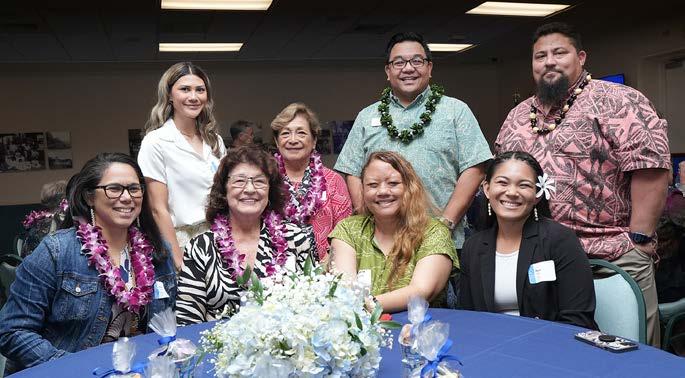
President Dr. Lynn Babington.
Chaminade University’s online bachelor’s degree program is designed for working adults in Hawai‘i who may already be serving as a teacher’s aide or, currently, in a similar position. The online delivery format will allow students to continue working while pursuing their bachelor's degree. This transformative program is 100 percent online, with a requirement to complete a studentteaching track. Students are paired with an academic advisor to guide them on the road to graduation.
ABOVE: A joint press conference to announce the Mu‘o Scholarships was held in 2023.
Pictured: Livingston “Jack” Wong, chief executive officer for Kamehameha Schools; Dr. Wai‘ale‘ale Sarsona, vice president of Kamehameha Schools' Hi'ialo Group; Lt. Gov. Sylvia Luke, and President Dr. Lynn Babington.
LEFT: Nagem Uiagalelei ’28, standing on the far left, is in the first cohort of Mu‘o Scholarship recipients. She attended the annual Mahalo Scholarship Luncheon on campus and is pictured with Patricia Takamiya, Bro. Allen Pacquing and Richard Uiagalelei, and seated from left, Napua Rosehill, Carol Gouveia, and Kawila and Kyla Castro.
10 | CHAMINADE MAGAZINE
ArticulationAgreements
OPEN GRAD SCHOOL DOORS FOR GRADUATES LIKE RACHEL ARAKAWA ’20
She’s more accustomed to dispensing medicine than she is advice. So, when asked what she would advise students to expect when they’re in medical school, Rachel Arakawa ’20 offered this simple suggestion: “Keep focus on your goals. And remember, you are just as qualified as anyone there.”
During a casual information session with students enrolled in Dr. Amber Noguchi’s HP 390 class—Advanced Topics in Health Professions Preparation— Arakawa shared her journey to George Washington University’s School of Medicine and Health Sciences. Like many freshmen who entered college amid a global pandemic in 2020, the former Silversword soccer and tennis player had to decide whether to stay home or move to Washington D.C.
“Even though all my courses were going to be online, I decided anyway to move to D.C.,” said Arakawa, who hopes to do her residency either in the Maryland–Virginia area or on the West Coast. “That first year was really tough because it was my first time being away from home, and I had six to eight hours of online lectures every day, and then another two to three hours of reviewing the previous day’s content. We covered everything I learned as an undergraduate in two months.”
Discipline and academic rigor, though, weren’t new to Arakawa. At the beginning of her sophomore year, the Kaneohe native decided to formally enter into an Articulation Agreement between Chaminade and George Washington University’s School of Medicine and Health Sciences.
At its essence, an articulation agreement document is a formal arrangement between two colleges or universities, outlining a structured transfer plan for specific program offerings. Depending on the program

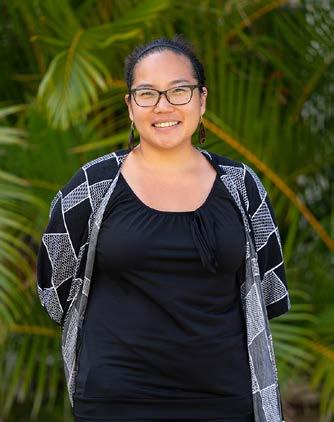
and degree, students have the opportunity to initiate their path towards advanced studies as undergraduates. This involves building a robust academic record and fulfilling prerequisites during their time at Chaminade. The agreement benefits students by guaranteeing the transfer of all completed classes (credits) and providing a clear pathway for ongoing academic progression.
Students who want to take advantage of participating in an articulation agreement, for example with George Washington University, should apply in January of their sophomore year. “This timeline avoids any gap year between undergraduate and graduate programs,” Noguchi noted. “Applicants are required to have spent two years (four semesters) in an undergraduate program of the contractual college and to have completed approximately 60 semester hours of course work by the end of the semester during which they apply.”
Articulation agreements streamline the transfer process for everyone involved. This will help alleviate the stress surrounding
the application process, the credit transfer process, and several other issues students might encounter when applying to a graduate program. By simplifying this process with transfer agreements, it is beneficial to all parties involved.
Now in her fourth year and two of three medical licensing exams behind her, Arakawa has applied to various residency programs and received 20 interviews. Her choice of post-graduate training will be in emergency medicine, a specific area that she has been interested in ever since she started her academic track in the health field.
ABOVE, LEFT: Chaminade President Dr. Lynn Babington welcomed Rachel Arakawa ’20 back to campus after she had an informal discussion with students.'
ABOVE, RIGHT: Dr. Amber Noguchi leads the Undergraduate and Pre-Professional Program.
VIEW FROM THE HILL | 11
A TUITION WIN: THE
HAWAI‘I
GUARANTEE PROGRAM
“This effort is really a part of Chaminade's service-oriented mission, which is to make higher education accessible to all Hawai‘i students."
Dr. Lynn Babington


12 | CHAMINADE MAGAZINE
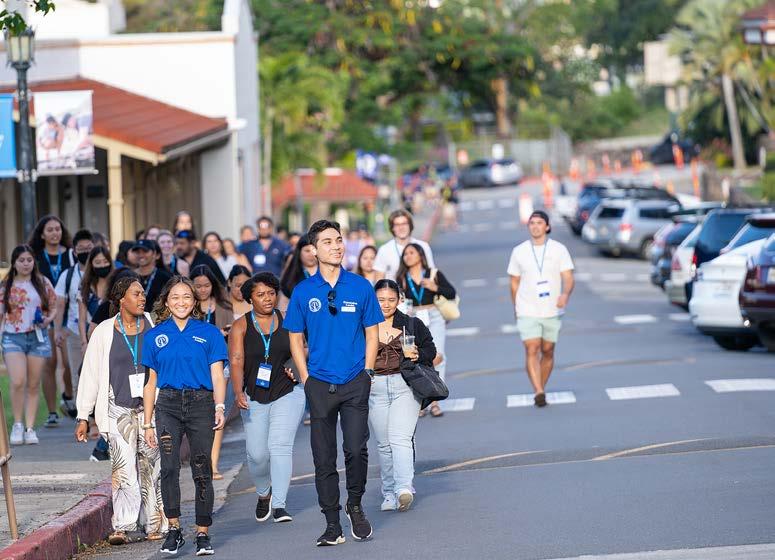
Chaminade defies the age-old adage that nothing in life is guaranteed. Unless it concerns tuition. Last fall, the University assured that all non-nursing incoming freshmen from Hawai‘i would pay the resident undergraduate rate of $11,304— the same amount students shell out at the University of Hawai‘i at Mānoa—a steep discount on Chaminade’s typical tuition price of $29, 000. In subsequent years, Chaminade’s resident tuition will change if and only when UH Mānoa’s does.
“After we launched the Hawai‘i Guarantee program, we saw a 30 percent increase in Hawai‘i applications/deposits,” says Jennifer Creech, Vice President for Enrollment Management and Associate Vice Provost for Student Success. “And we’ve also seen an increase of 27 percent from Fall 2022 to Fall 2023. Overall, we’re trending in the right direction.”
The cost of college has become a subject of significant concern and discussion in recent years. Rising tuition fees, along with such additional incidental expenses as textbooks, housing and meal plans, have made pursuing higher education financially daunting for many individuals and families.
This, of course, has led to concerns about accessibility and affordability, particularly for low-income and middleclass families. In response, policymakers, educators and advocacy groups have been exploring various strategies to address the issue, such as increasing need-based financial aid, expanding access to community colleges and trade
schools, and implementing tuition-free or reduced-cost college programs at the state or national level.
“This effort is really a part of Chaminade’s service-oriented mission, which is to make higher education accessible to all Hawai‘i students,” says President Lynn Babington, Ph.D. “Across the country, less than half of students graduate on time. Our Hawai‘i Guarantee is designed to help students map out their academic journeys, and receive the course offerings and advising support needed to get them there. They will have a clear path to a four-year graduation.”
In addition to the predictable tuition rates, the Hawai‘i Guarantee program offers various financial aid opportunities, including scholarships, grants and work-study programs, to further reduce the financial burden on students, and to ensure that all students have access to the resources they need to succeed academically and professionally. However, to receive the Hawai‘i Guarantee rate, freshmen must be continuously enrolled at Chaminade for consecutive semesters and graduate in four years.
“We are committed to helping make the dream of higher education accessible to all Hawai‘i students,” Babington asserts. “Today’s students hold the power to change the world for the better—and we are proud to develop that next generation of leaders right here at home.”
When asked about the impetus for the new tuition schedule for local students, Creech said the University wanted to strengthen its commitment to the
community. “Chaminade is a communityfirst University,” she added. “We wanted to remind our local residents that Chaminade is here and that the school is a good option to pursue their higher education.”
Enrollment at Chaminade has remained strong in recent years, and this Fall’s 484 incoming students represents the largest number in 20 years. The Hawai‘i Guarantee program is designed to offer students a transparent and predictable tuition structure, helping them plan for their educational expenses more effectively. Through this program, Chaminade pledges to keep tuition costs stable for students throughout their four years of undergraduate study, providing peace of mind and financial stability for both students and their families.
Furthermore, Chaminade is committed to providing a supportive learning environment that fosters student success. Through small class sizes, personalized attention from faculty and staff, and a strong sense of community, students can thrive academically and personally while pursuing their educational goals.
“Education is transformative,” Babington said. “Overall, the Hawai‘i Guarantee program exemplifies Chaminade’s dedication to making higher education accessible and affordable for all students in Hawai‘i. By removing financial barriers and providing comprehensive support services, Chaminade empowers students to achieve their full potential and make meaningful contributions to their communities and society at large.”

VIEW FROM THE HILL | 13
The Significance of the Office of Student Success
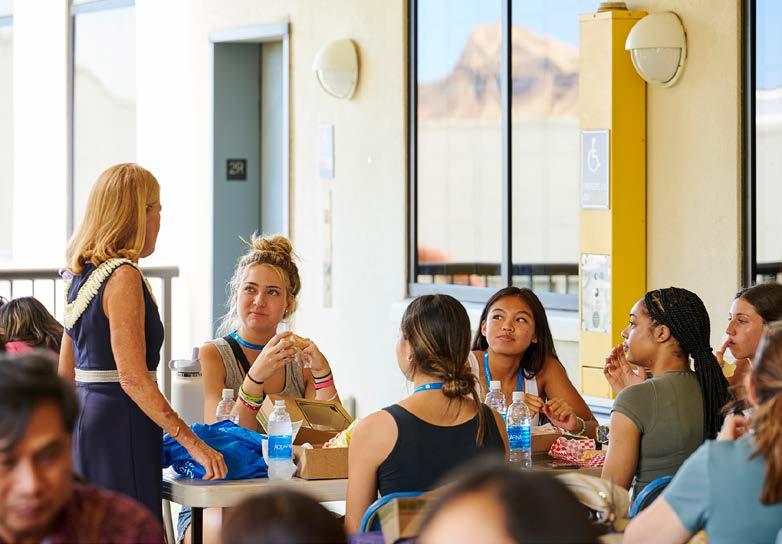
Trachelle Iwamoto ’26 wasn’t quite sure what to expect when she arrived on campus from Kapa‘a, Kaua‘i. Nor did Kryzandreah Español ’26 and Easton DelaCruz ’26. As freshmen, Iwamoto, Español and DelaCruz felt anxious about the transition from high school to university, uncertain about the rigors of academia and their own self expectations.
However, it’s not uncommon for freshmen to feel nervous when experiencing what many consider a rite of passage from the teen years to early adulthood. In response, universities have undergone significant transformations in recent years, marked by an increased focus on student success.
“In 2020, we re-evaluated our support services and designed a one-stop center—Office of Student Success— that includes academic advising, career development, tutoring and learning services, military student benefits, registrar and records, and study abroad,” says Jennifer Creech, Vice President for Enrollment Management and Associate Vice Provost for Student Success. “We’re committed to providing comprehensive support and resources to ensure that students not only excel academically, but also thrive in their overall collegiate experience.”
The concept of student success has evolved from a narrow focus on academic achievement to a more holistic approach,
which encompasses personal growth, career readiness and well-being. Historically, universities primarily concentrated on instructional and administrative functions, with less emphasis on proactive student support. The changing dynamics of higher education, including shifting demographics, technological advancements and an increased awareness of the diverse needs of students, prompted the establishment of dedicated offices to address these challenges.
“If I have a question or experience any difficulty, I’ll go to the Student Success Office,” says Español, who is studying to be a nurse and aspires to become a cardiothoracic surgeon. “I feel truly supported in every aspect of my academic journey here. Chaminade has created a supportive environment that extends beyond just academic assistance, making me feel connected and valued.”
Before the start of their freshman year, Español, Iwamoto and DelaCruz all attended the Apo Haumana Retreat, a program introduced in 2021 as a facultyled initiative to help first-year students transition to Chaminade through building connections with faculty and peers outside of the classroom.
“It gave me a foothold into the university,” Iwamoto says. “I met a lot of other students, mentors, staff and faculty who were all welcoming and personable. I felt like they wanted to know who I was as a person.”
Now a peer advisor with the Apo Haumana program, DelaCruz works closely with the Office of Student Success to create helpful workshops for firstyear students. He also assists program participants with different obstacles they may face throughout their first year.
14 | CHAMINADE MAGAZINE
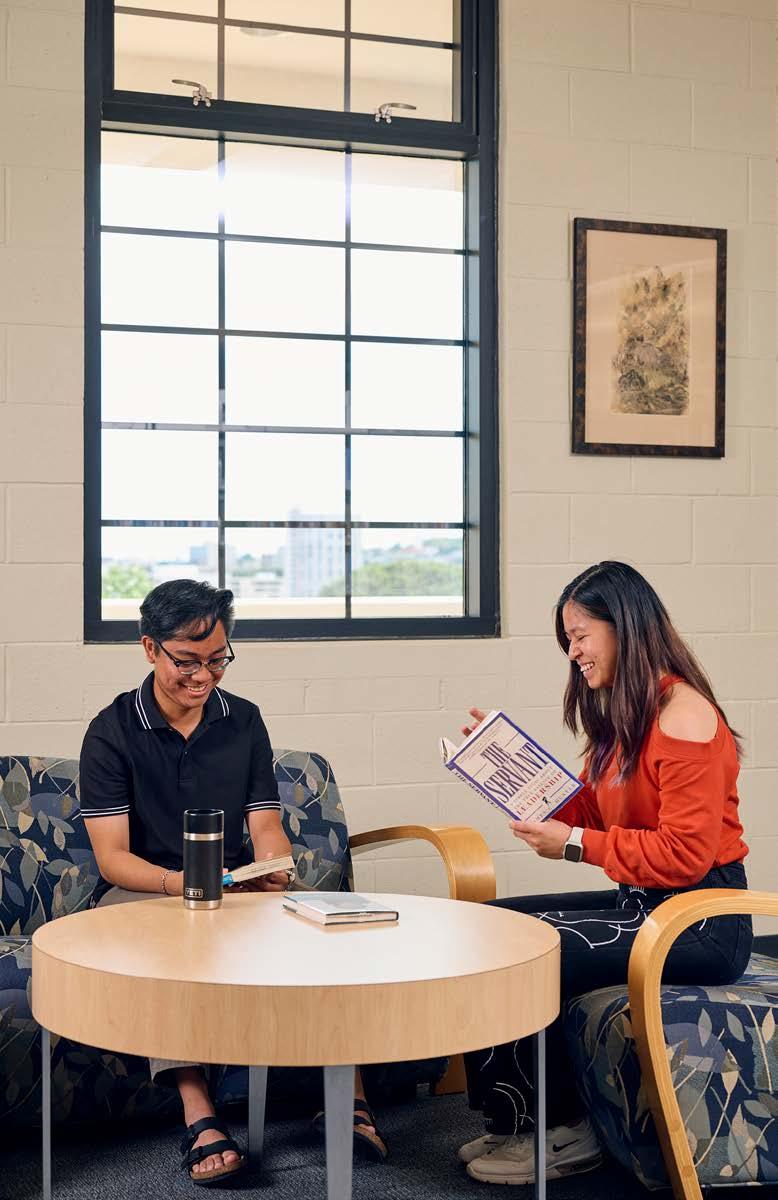
“Having been a member of the program during my first year, I felt that it benefited me as I transitioned from high school to college,” says DelaCruz, who has ambitions to run for the Governor’s office when he returns to Saipan. “This is my way of giving back to Chaminade since I’ve personally received so much support in my academic journey.”
Many institutions offer programs specifically designed to support students during their first year, helping them
smoothly shift into the university environment. At Chaminade, that support is tailored to each student. Unlike the past, according to Creech, interactions between advisers and students seemed transactional; students were being told what classes to take and what to do as opposed to the student owning his/her own educational journey.
“We’re here to help them navigate that journey,” Creech says. “Everything is tailored; it’s not one size fits all. We triage
“We complement what the faculty are already doing — mentoring, advising and counseling. The Office simply adds another layer of support."
Jennifer Creech Vice President for Enrollment Management and Associate Vice Provost for Student Success
and assess the problem to make sure that our Chaminade students succeed. We complement what the faculty are already doing—mentoring, advising and counseling. The Office simply adds another layer of support.”
Research has shown a positive correlation between the presence of robust student success initiatives, and improved retention and graduation rates. By addressing challenges early, providing targeted interventions, and cultivating a supportive community, the Office of Student Success plays a crucial role in ensuring that students persist through their academic journeys and successfully attain their degrees.
“When we re-structured the office, we leveraged technology and we updated our student portal,” Creech explains. “Today, we use predictive analysis to identify students who may be at risk and we intervene before they drop out. Our Fall 2023–Spring 2024 retention rate is 88.3 percent, and our enrollment numbers for undergraduate FTE (full-time equivalency) is up by eight percent. All positive news.”
VIEW FROM THE HILL | 15

DESTINED FOR GREATNESS:
KAUA‘I MAYOR DEREK KAWAKAMI '01
BY SIMPLICIO PARAGAS
Kaua‘i Mayor Derek Kawakami ’01 and Monica Kawakami ’01 attended Chaminade University at the same time.
16 | CHAMINADE MAGAZINE
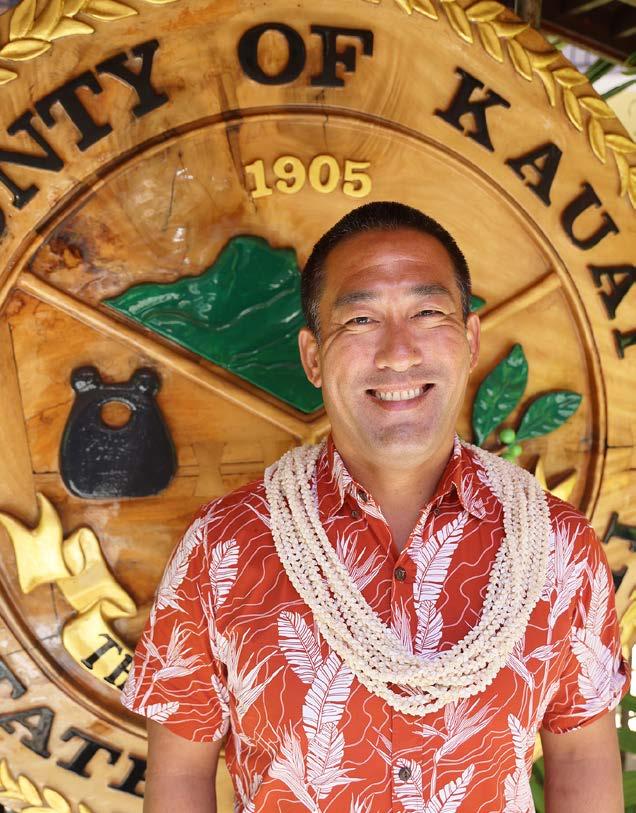
She had him at Chaminade.
For many senior high school students, choosing a college depends on several factors: cost, location, size, personal interests, campus life, graduation rates and the potential return on investment. However, for Kaua‘i Mayor Derek Kawakami ’01, the primary reason he chose Chaminade University was simple—he met a girl.
“I know it sounds shallow, but it’s the truth,” said Kawakami, who served as the keynote speaker at Chaminade’s 65th Commencement in 2023. “But knowing what I know now about Chaminade, I would have chosen it one thousand times over any college in the country.”
The son of the late Charles and Arlene Kawakami, Kawakami is a third-generation Kaua‘i resident, and is now serving his second term as the Garden Isle’s chief executive officer. Having shepherded the island through a once-in-a-century pandemic and now through recovery, Kawakami does not shy away from the necessary hard work of what he calls, “the people’s business.”
The physically fit 46-year-old is a no-nonsense-type of leader who likes to roll up his sleeves, get into his steel-toecapped boots and don his hard hat at the drop of a dime.
During COVID, he was forced to make a series of difficult—and, at times,
unpopular—decisions, including lockdowns, turning public campsites into Safe Zones to prevent the spread of the virus, enforcing mandatory vaccine mandates and curfews, and instituting strict protocols and safety measures. Yet, through it all, he became widely known, erroneously by the way, as the TikTok mayor. A 30-second clip that he posted went viral on Instagram and not the aforementioned social media site. In the video, he performs an amusing dance and a card trick, then encourages people to wash their hands. It was all an effort, he said, to break the monotony of staying home.
“I have to say my wife put me up to it and my daughter instigated it,” Kawakami chuckled. “We just wanted to help people
“I have a lot of clear memories of my time at Chaminade, and the people who made an impact on my life."
Derek Kawakami '01
get through some tough times, we wanted to do it together, and at the end of the day, we wanted people to feel like they mattered and that we cared about them.”
He attributes this empathy as one of the values he learned while completing his bachelor’s degree at Chaminade, where his now-wife, Monica nee DeBusca Lizama, also graduated with an undergraduate degree in 2001 and a master’s in education in 2006. A selfdescribed average “C” student, in his 2023 Commencement keynote, Kawakami evoked the memory of several Chaminade professors, who made an impact in his life.
One such individual was the late Marlene Baker ’72, MS ’88, who enjoyed a 45-year career in the Student Success and Records office. Kawakami said he would bring Kaua‘i cookies to her so that she would build him a favorable schedule, quipping that was probably his first sign of being a politician. Henry Gomes, or “Uncle Henry '' as Kawakami affectionately refers to the late revered professor, would talk to him about “country-kine things,” and made him feel like it was perfectly OK to just be him. Then there was recently retired Yukio Ozaki, who opted not to cancel an art class, even though enrollment plummeted from 15-20 students to a lone Kawakami overnight.
“Now that I have 20/20 hindsight vision, what I’m about to say is the last thing my professors would want to hear,” Kawakami said. “As the sands of time have passed, some of the knowledge, some of the details of the countless hours of
TAKING THE LEAD | 17

classroom lessons, lectures and knowledge have faded. But what has remained is how the power of the human element can change the trajectory of one person’s life. All it takes is just one person. One person that believes in someone and is willing to invest time, effort and kindness can uplift a community.”
It’s with this indomitable spirit that helps inform Kawakami’s leadership. He cited three principles that he follows: 1) Act in good faith, which helps build trust; 2) always act with the community’s best interest; and 3) establish a sound, prudent process of decision making.
“Not everyone will agree, but I can defend my position,” Kawakami asserted. “Compromise is an art, and by compromise,
I don’t mean consensus, which, when I hear, often tells me that things are not going to move forward.”
Life for Kawakami has certainly had a forward momentum. When he graduated from Chaminade, his first job was a grocery clerk for Longs Drugs Kaimukī. The pay was $200 per week, and his duties included sweeping the floors, stocking the shelves and racks with those familiar yellow books, and whatever needed to be done.
“I had to put my business degree to work,” Kawakami said. “I started at the entry level, but that’s how I thought it would work. Just because I had a degree didn’t mean I was going to start at a higher level. My degree was supposed to give me the tools to get to that next level, and it did.”

LEFT: Born and raised on The Garden Isle, Mayor Kawakami is grateful to his Chaminade teachers and mentors.
BOTTOM: Mayor Kawakami is not afraid to roll up his sleeves and get behind the wheel to help with the construction of new roads.
One day, he received a call from his dad, asking him to come home to help out in their own grocery store. His dad told him if he could work at Longs, then certainly he can work at the family’s own enterprise. However, there was one problem: Monica was pursuing her master’s, and she wasn’t about to quit and return to Kaua‘i. So, she proposed an ultimatum: He had to marry her.
“I went to Kahala Mall and applied for a loan, which was my first loan ever,” Kawakami recalled. “I qualified for $9,000—which was big bucks back then for me who was making $200 a week— and I went upstairs to a diamond specialist, and chose an engagement ring.”
Married now to Monica for 20 years, the couple have two children, Hailee and Christopher. A dedicated family man, Kawakami praises his family for their support throughout his two terms as Kaua‘i’s mayor, as well as his years of service in the State Legislature. He also credits his experience at Chaminade as helping shape his style of leadership.
“I have a lot of clear memories of my time at Chaminade, and the people who made an impact on my life; the faculty and staff truly cared for us,” Kawakami said. “I gained a worldly view of different cultures, and how to appreciate our differences.”
And despite all the pressures of governing, Kawakami said, from a pressure standpoint, being the Commencement keynote speaker was a big one.
“If I were to go back to my 20- or 21-year-old self, and be told that I was going to be the Commencement speaker at Chaminade one day, I would have said ‘Get out of here!’” Kawakami said. “I never imagined a picture in which I would be in a position speaking to the graduating class and their families. I’m grateful for this opportunity to come back around and to have been a part of Commencement.”
18 | CHAMINADE MAGAZINE

THE EVERLASTING MARLENE BAKER ’72, MS ’88
He is not sure if she ever saw the text he sent her of a picture of his newborn son. But, two days later, Keegan Tomita ’13 learned that his “campus mom” had lost her battle to cancer. Marlene Baker was more than just an administrator for Tomita, whose family grew close to the affable longtime Silversword, inviting her to stay with them on Mercer Island in Washington during the summer and even inviting her to Keegan’s wedding.
“Who invites their counselor to their wedding,” quips Tomita, chuckling as he utters those words. “She was truly my mom away from home who was just like family. I still think that I can pick up the phone and hear her voice.”
Jennifer Creech can. The Vice President for Enrollment Management and Associate Vice Provost for Student Success kept the last voicemail Baker ever left her just before she was admitted to the hospital in July 2022. Her voice weakened from chemotherapy treatment, Baker told Creech that she “had to go to the hospital, but not to worry, and that she would be back in the office in a couple of days.”
“She knew all the secrets of Chaminade and they were in her vault,” says Creech, gesturing to her temple. “She would get here every day by 6 in the morning, placing flowers on peoples’ desks and waiting for students to visit her in her office. Chaminade was truly her home.”
And it was Baker’s home for more than 50 years, dating back to a time when she left Maui as a 17-year-old college-bound student, eager to pursue a bachelor’s degree at the Kalaepōhaku campus. She would eventually attain her BA in Social
Studies in 1972, later earning a master’s in Counseling Psychology in 1988. Not only was Baker an empathetic listener but she was a consummate student, a trait that wasn’t lost on English professor Linda Iwamoto.
“My first memory of Marlene was as a student erectly sitting in the first row,” says Iwamoto, who would enjoy a five-decade-long relationship with Baker and would serve as Baker’s matron of honor at her wedding. “She was always attentive, very shy, and she had beautiful handwriting.”
These days, the art of cursive writing has given way to dexterous texting and instant messages, such as the one Pono Riddle ’18, MEd ’21 received from Baker on July 28, 2022. After sending her a text noting that he would see her when he returned from a trip, Baker wrote “I love you and miss you.”
“I first met Marlene online when she made my schedule my freshman year,” says Riddle, Associate Director of Student Success. “One day I was working at Macy’s and I saw a woman wearing a name tag with the name Marlene in the Bridal Registry department. We got to talking and it turned out that I was the (Pono) Andre Riddle whom she created the class schedule for. That day sparked a forever friendship throughout my time at Chaminade. I still miss hearing the Hawaiian music coming out of her office.”
It wasn’t unusual for Baker to receive invitations to people’s homes or to be asked to become a godmother. Koreen Nakahodo, Ph.D., made the request twice: once for herself and another for her daughter. “I’ve known Marlene since
“It gives me great pride and joy—as I am sure it will with others—to contribute to the Chaminade Fund in honor of Marlene. She truly brought so much meaning and joy in so many people’s lives here at Chaminade."
Koreen Nakohodo, Ph.D. English Professor
I was 21 years old,” says the Chaminade Assistant Professor of English. “Since she was from Maui, she took care of all the Neighbor Island kids, feeding them at times and even inviting them to her home for the holidays when they wouldn’t fly home.
“There were so many people that Marlene touched,” Nakahodo adds. “And it gives me great pride and joy—as I am sure it will with others—to contribute to the Chaminade Fund in honor of Marlene. She truly brought so much meaning and joy in so many people’s lives here at Chaminade. There’s not much that Marlene wouldn’t do for you.”

ABOVE: Longtime friends and colleagues
Marlene Baker '72, MS '88, Pono Riddle ’18, ’21 MEd and Jason Quest.
TOP LEFT: Keegan Tomita ’13, left, considered Marlene Baker his “campus mom.“
HONORING THOSE WHO PERSONIFY THE MARIANIST VALUES

Overcome by emotion, tears cascaded down the cheeks of Victoria DelaCruz ’24 as Bro. Ed Brink named her as this year’s Founders’ Award winner, describing her traits of selflessness, commitment, hospitality, graciousness, faith and family. A Chaminade Scholar majoring in Data Science, Analytics and Visualization (DSAV), DelaCruz exemplifies the Marianist education and values.
“Faith has been a part of her journey before coming to Chaminade,” said Brink, Vice-President of Mission and Rector. “This year, she joined the new Student Ministry Team and made a suggestion about having a praise and worship evening at the end of one of the meetings. Although it was one of the last ideas talked about at the meeting, it was one of the first events to move from an idea to an actual event. And that was because of Victoria’s commitment to it.”
Every year during Founders’ Week, the Rector’s office presents the Chaminade
Award, the Marianist Award and Founders’ Award to a faculty member, supporting staff member and student, respectively, who embodies the Marianist values.
His voice crackling at times while reading the achievements of the winners of the Heritage Awards, Brink announced the other two honorees: Chaminade Award recipient Dr. Janet Davidson, Vice Provost and professor of criminology, who was described by one of her nominators as resilient, reliable and consistent; and Amy Takiguchi '02, MBA '06, Director of Financial Aid, Marianist Award, whose efforts to help students go beyond and above a simple answer.
“It was a chicken-skin moment when Dr. Babington informed me of the award,” said Takiguchi, an alumna who started her career at Chaminade as a student worker with Human Resources and has since moved up the ranks. “I have a great team and that’s what makes working here such a rewarding experience.”
LEFT: Pictured are Bro. Ed Brink, Victoria DelaCruz '24, Dr. Janet Davidson, Amy Takiguchi '02, MBA '06 and Dr. Lynn Babington.
For Davidson, the Chaminade Award is not an individual feat, but one that belongs to her team. “I am honored and humbled, but I don’t like the attention,” she said. “But I could have never done it alone. The accolades and attention I receive are because of a great supportive team that works collaboratively to accomplish a lot.”
In his presentation during a special mass ceremony to celebrate Founders’ Week, Brink said these awards are meant to remind all of us of the mission of this University, and the importance of trying to live out that mission on a daily basis. “We gather today to be inspired and to hopefully recommit ourselves to being the best member of this community that we can be,” he added. “Fr. Chaminade wanted those who got caught up in the work that he inspired to be ‘a spectacle’—to give witness to others of how a life based in faith and service could make a difference in the world.”
20 | CHAMINADE MAGAZINE
Forging Bright Futures Beyond Prison
BY SIMPLICIO PARAGAS
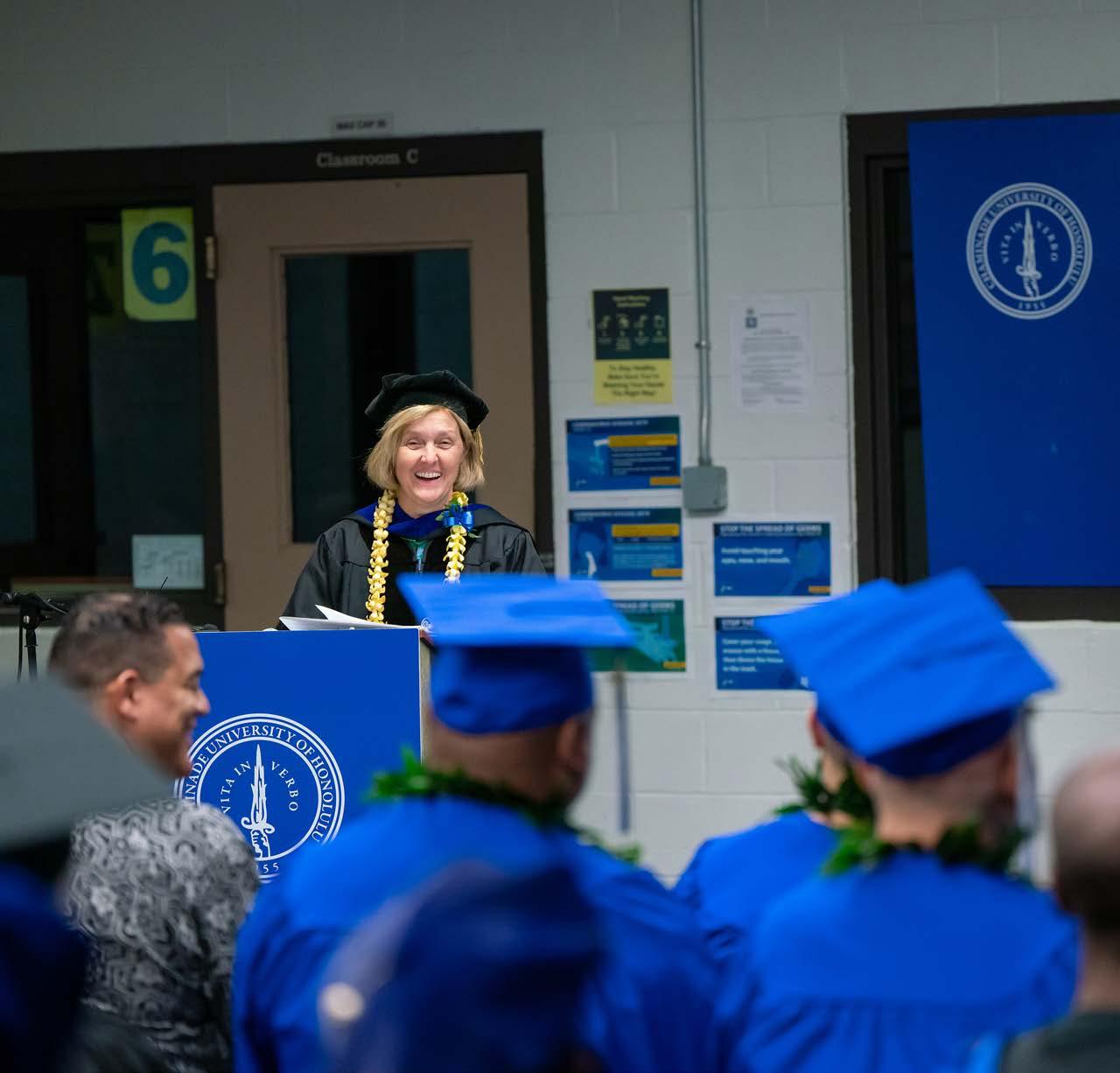
With support from a $750,000, three-year grant from the Andrew W. Mellon Foundation and $1.5 million in congressionally directed spending, also known as earmarks, secured by U.S. Senator Brian Schatz, Chaminade University will expand its Higher Education in Prison (HEP) program, which aims to be a pathway for participants to leave incarceration with new identities, perspectives and goals to help them thrive in society.
“At Chaminade, one of our primary Marianist values is to advocate for social justice for transformative change,” said Chaminade President Lynn Babington, Ph.D. “We support a rehabilitation-through-education narrative, which we know is essential to incarcerated individuals finding a pathway to a second chance and a better future.”
TAKING THE LEAD | 21
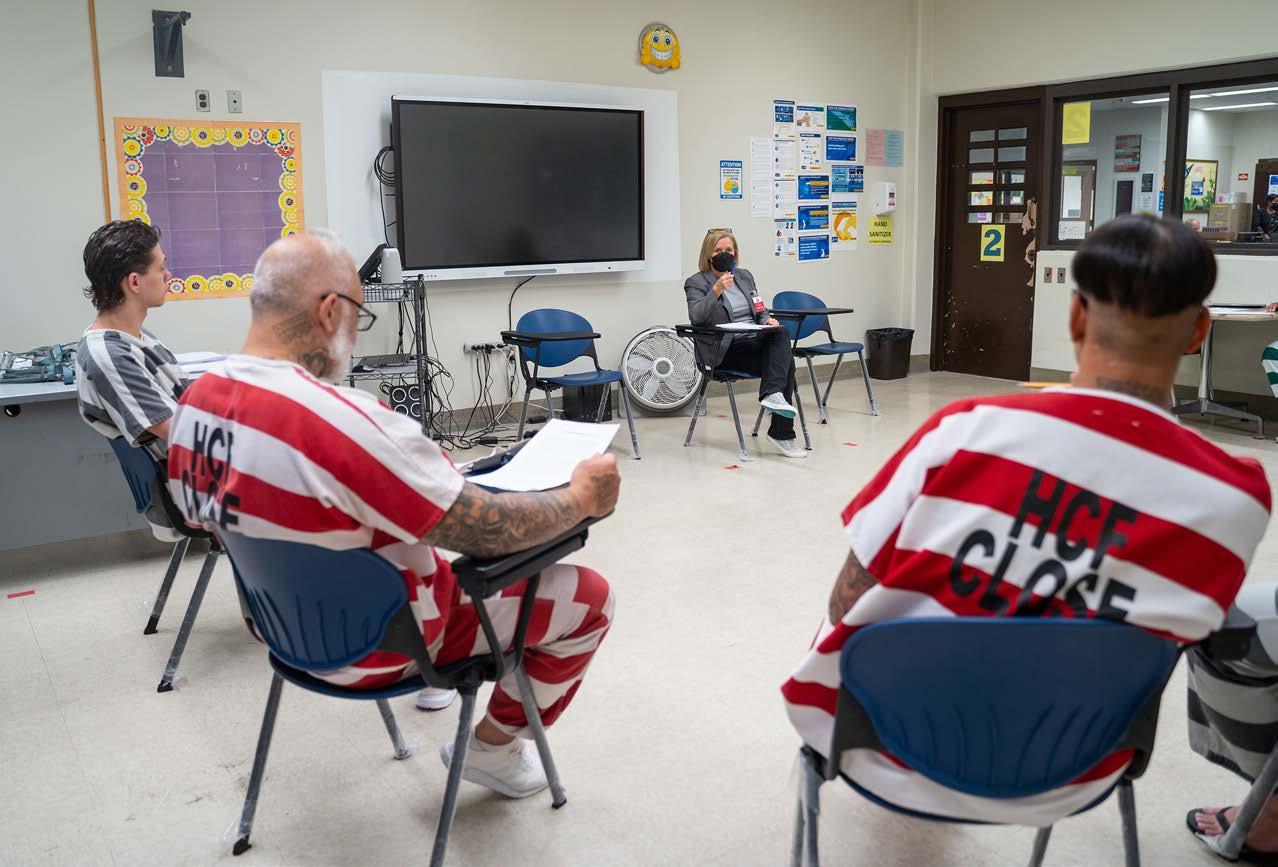
“If we want safer communities. If we want healthier families. If we want people who are incarcerated to have a chance when they come out, these are the types of rehabilitative programs we should be offering."
Dr. Janet Davidson Vice Provost for Academic Affairs
Chaminade’s current HEP program serves males who are incarcerated at Hālawa Correctional Facility. However, moving forward, the University plans to extend its cohort model HEP program to the Women’s Community Correctional Center (WCCC), as well as to those men serving time 3,000 miles from home at the Saguaro Prison in Arizona.
The goal is to expand degree offerings, starting with the men in Hālawa, to include an AA in Liberal Arts that can be extended to a BA in Interdisciplinary Studies. The coursework for the three degree programs will emphasize a humanities and liberal arts curriculum, and will be offered in a culturally responsive and trauma-informed way that will be relatable with the overrepresented indigenous prison population.
“If we want safer communities, if we want healthier families, if we want people who are incarcerated to have a chance when they come out, these are the types of rehabilitative programs we should
be offering,” said Dr. Janet Davidson, Chaminade’s Vice Provost for Academic Affairs and a leader in criminology. “The idea is to shift the mindset. It will cost society less in the end.”
Citing racial equity as a primary condition that makes HEP programs urgently necessary, the grant underscores the overrepresentation of Native Hawaiians in the criminal justice system. According to data collected by the Office of Hawaiian Affairs, Hawai‘i’s incarceration rate increased by 403 percent from 1978 to 2016, with Native Hawaiians affected disproportionately. Though accounting for only 18 percent of the state’s adult population, Native Hawaiians represent 37 percent of those incarcerated. This statistic includes Native Hawaiian women who make up 44 percent of the incarcerated women in Hawai‘i.
While imprisoned women already have access to some college courses, they don’t have degree options. This Mellon grant and
22 | CHAMINADE MAGAZINE
congressional earmark will change that. “Since women are more likely than men to be the primary caretakers of dependent children prior to incarceration,” Davidson said, “their success after leaving prison will have a positive impact on their children and families, multiplying the effects of a single college degree.”
Providing education in prison has indeed proven to reduce recidivism rates, and is associated with higher employment rates, which will improve public safety and allow individuals to return home to their communities and contribute to society. Moreover, a 2018 study from the RAND Corporation, funded by the Department of Justice, found that incarcerated individuals who participated in correctional education were 48 percent less likely to return to prison within three years than incarcerated individuals who did not participate in any correctional education programs. RAND also estimated that for every dollar invested in correctional education programs, four to five dollars are saved on three-year, re-incarceration costs.
“The success of this pilot program— between Chaminade University of Honolulu and the Hawai‘i Department of Public Safety—demonstrates that partnerships can lead to transformative change,” Davidson said. “With the support and guidance of Chaminade’s distinguished faculty and support staff, and the cooperation and backing of Hālawa Correctional Facility, these individuals have embraced the opportunity to redefine their futures. This program is part of Chaminade’s mission to educate for service, justice and peace. We hope that with their newly gained education, these students will have the skills needed to rebuild their lives upon reintegration into society.”
Chaminade faculty celebrate the commencement ceremony at Hālawa Correctional Facility.
Photos taken after authorization and access to the Hālawa Correctional Facility were approved by respective authorities.
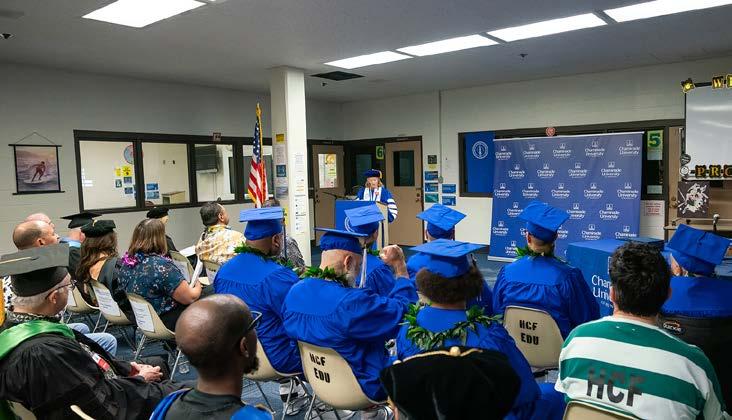
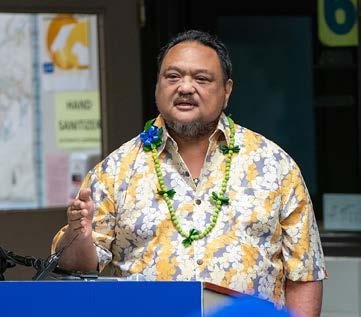
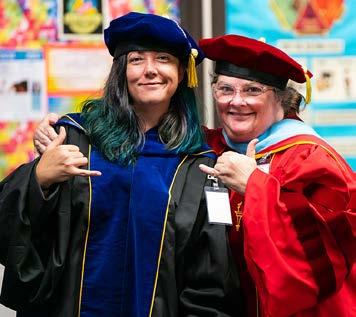

In April, Chaminade University was awarded $1.5 million in Congressionally Directed Spending, which will be used to increase capacity of the Higher Education in Prison program, to expand it to include incarcerated women and a bachelor's degree.
TAKING THE LEAD | 23



24 | CHAMINADE MAGAZINE
Photos courtesy Averylily Design Studio

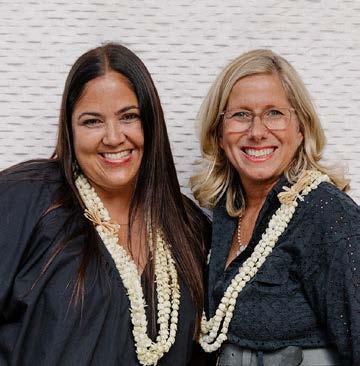


DESIGNING WOMEN
Avery Solmssen ’03 and Lily Kanter
open full-service design studio
BY SIMPLICIO PARAGAS
Avery Solmssen likens her first meeting with a potential client as a date, posing the question to herself: “Do we match?” Apparently, during her initial encounter with Serena & Lily CEO, Lily Kanter, the two immediately clicked. In addition to colors and textures, they talked about interior design and Solmssen’s approach to her own work, all the while developing a burgeoning close personal relationship.
“I really like to get to know my clients before I fully commit to a job,” says Solmssen, who graduated with her BFA in Interior Design from Chaminade in 2003. “Every project takes on a different life; no two projects are ever alike.”
Interior design has a timeless appeal as a profession, drawing talented individuals who possess a passion for creativity, aesthetics and transforming spaces into functional works
Business partners Avery Solmssen '04 and Lily Kanter
TAKING THE LEAD | 25
of art. That appeal, in part, is the reason Solmssen pivoted from her first career in education. After earning her bachelor’s degree in Sociology from the University of Colorado in 1998, Solmssen changed her mind about getting her degree in special education, choosing instead to pursue her BFA in interior design at Chaminade University.
“At the time, I was a teacher with Assets School, and I really enjoyed working with the kids,” Solmssen says. “But I’ve always had an interest in interior design so I chose to change careers.”
When the term “interior design” comes to mind, it often evokes images of HGTV, room-makeover challenges or DIY decor projects on Pinterest. However, what they're actually envisioning is interior decorating. Although decorating contributes to crafting functional and aesthetically pleasing living spaces, the role of an interior designer stands apart from interior decorating in significant ways.
Though there are areas of common ground between interior design and interior decorating, they are inherently distinct. Interior design involves the fusion of art and science to comprehend human behavior, thereby crafting functional spaces within a structure. Conversely, interior decorating focuses on furnishing or embellishing a space with decorative elements to achieve a specific aesthetic. In essence, interior designers may engage in decorating, whereas decorators do not engage in design.
During the pandemic, Kanter purchased a home on Hawai‘i Island that was move-in ready, replete with reclaimed wood and a natural palette of colors and varying patterns. After asking her realtor for the designer’s name, Kanter connected with Solmssen, who was then a senior designer at the Honolulu-based firm Philpotts Interiors.
“Meli James (co-founder of Mana Up, president of the Hawai‘i Venture Capital Association and a previous speaker for the Hogan Entrepreneurial Program) introduced me to Lilly at an event,” Solmssen recalls. “We met in 2018 in Mauna Kea, and she has been a mentor to me ever since.”
She is now also a business partner, with the two collaborating to open their portmanteau Averylily Design Studio in 2022 and Averylily Home Collection this past January.
“It was all Lily’s idea,” Solmssen says. “She encouraged me to work on my own, which I knew would be different after always having worked for someone else for the past 22 years.”
One of the greatest motives for Solmssen’s willingness to open a design studio was to be able to keep jobs in Hawai‘i, and hire local talent. She believes that it’s important to support Hawai‘i’s future designers and to mentor them, like Kanter has mentored her.
“We do a lot of team bonding,” says Gerlie “Gigi” Valiente ’17, a fellow Chaminade alumna, who Solmssen brought on to be a designer with Averylily Design Studio. “I’ve learned a lot from Avery who taught me that we need to learn to be comfortable in uncomfortable situations, and it’s not always about being right.”
Since opening their design studio and now a home collection that carries such household basics as linens, home décor, tabletop accessories and beach towels— all inspired by Hawai‘i’s natural beauty and designed in Hawai‘i—Solmssen and Kanter are able to offer a comprehensive interiordesign service for both renovations and new construction.
“One of our main goals is to keep jobs in Hawai‘i,” Solmssen emphasizes. “We want our local high school and college students to be able to come to our studio, and to develop their skills and apply them in real life.”
“I've learned a lot from Avery who taught me that we need to learn to be comfortable in uncomfortable situations, and it's not always about being right."
Gerlie “Gigi" Valiente '17 Designer
“One of our main goals is to keep jobs in Hawai‘i. We want our local high school and college students to be able to come to our studio, and to develop their skills and apply them in real life."
Avery Solmssen '03 Co-founder Averylily Design Studio
26 | CHAMINADE MAGAZINE
TINA ANDRADE ’05, MPT ’14: A Leader Ready to Give Back

A day after the catastrophic Maui wildfire, Tina Andrade was already anticipating a groundswell of pleas for assistance. As the Chief Operations Officer of Catholic Charities Hawai‘i, Andrade is no stranger to emergency crises. After all, the aftermath of COVID-19 still lingers among some residents who continue to struggle financially, physically and emotionally.
Serving Hawai‘i since 1947, Catholic Charities Hawai‘i has rendered aid to local residents of all faiths and cultures in previous disasters, including Hurricane Iniki, the recent Kīlauea eruptions, the COVID-19 pandemic and, more recently, the worst natural catastrophe in Hawai‘i’s history.
“We typically serve approximately 40,000 individuals per year,” says Andrade, who engages the local community in Catholic Charities Hawai‘i’s mission through its Social Policy efforts and with the neighboring islands advisory boards. “We provide more than 40 social services and programs, ranging from rental assistance and mental health to immigration and senior advocacy to assist our kūpuna. ”
Born and raised in Honolulu, Andrade graduated from Kamehameha Schools, and received her bachelor’s degree in religious studies and master’s degree in pastoral theology from Chaminade University.
Prior to joining Catholic Charities Hawai‘i, she was an educator at several Hawai‘i Catholic schools and worked within the Catholic community in the area of religious education and social ministry. Additionally, she has an Executive Certificate in Nonprofit Transformational Leadership from Notre Dame University and a Professional Certificate in Human Resource & Workforce Development & Management from Michigan State University.
“I started with Catholic Charities Hawai‘i years ago as a receptionist until I decided to enroll at Chaminade,” Andrade says. “I really believe in our mission and our values—which are similar to Chaminade’s— that were first established by the Maryknoll Sisters. We seek to help strengthen families in the community and, to do so effectively, we partner with government agencies, hospitals and parishes, and we’re also part of Aloha United Way’s 211 helpline.”
With affordable housing as the number one priority in Hawai‘i—especially on Maui right now— Andrade has collaborated with community partners in securing $200 million to build affordable housing. As part of Catholic Charities executive team, she helped oversee the distribution of more than $150 million in federal rental assistance to tenants during the pandemic.
“Tina has been a trusted and collaborative member of our executive team for the past 20 years, helping us identify the priorities of our agency’s social policies to address poverty and social justice,” says CEO and President Robert Van Tassell, in a released statement. “With her extensive knowledge of our organization’s history, programs, personnel, partners and future potential, she is a natural fit to run CCH’s day-to-day operations.”

BE-JAY KODAMA ’86, MBA ’16:
A Strategic, Collaborative Partner
Catholic Charities Hawai‘i (CCH) has named Be-Jay Kodama as Vice PresidentPhilanthropy, where she will be responsible for overseeing all fund development and community engagement programs for Hawai‘i’s largest social services agency. Most recently, Kodama served as Director of Advancement at Island Pacific Academy, a private college-preparatory school. In addition to providing leadership and guidance for all campus fundraising, she was responsible for developing marketing initiatives, donor stewardship, and collaborating with the Board of Trustees to support the school’s goals and priorities.
“Be-Jay comes to Catholic Charities Hawai‘i with a wide array of fundraising and deep community relations experience,” said CCH President and CEO Rob Van Tassell. “Her strong relationships within the local community will be invaluable in supporting our social programs that aid those most in need.”
Kodama previously worked as Director of Alumni Relations at Chaminade University of Honolulu, managing all aspects of the school’s alumni relations programs, services and activities. While serving as a staff member at Chaminade, she received the Marianist Award in demonstrating the school’s values of compassion and service.
ABOVE: Be-Jay Kodama, center, with colleagues at Catholic Charities Hawai‘i.
CHANGE MAKERS | 27
Silversword Spotlights
SHINING LIGHT ON THE MANY WAYS CHAMINADE ALUMNI MAKE A POSITIVE DIFFERENCE IN THE COMMUNITY.
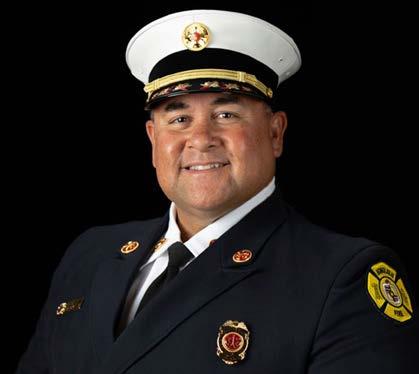
KEVIN MOKULEHUA ’04
How did your education at Chaminade University of Honolulu contribute to your professional success?
My college education provided me with the leadership and management skills necessary to manage personnel and to make strategic decisions. I also learned effective communication and interpersonal skills that have enabled me to communicate clearly with my team members, superiors and other agencies. But most of all, since I had taken a “break” from school in 1995, resuming in 2001 to attain my degree in 2003 while being a member of the Honolulu Fire Department, my commitment to education instilled a mindset of continuous learning throughout my career.
Can you recall a specific moment or experience during your time that had a significant impact on you, either academically or socially?
In 2001, having served three years in the Honolulu Fire Department, something “clicked” inside of me that drove me to want to finish my college degree, basically finishing something that I had started back in 1992. It was at this moment when I had decided to fully commit myself to completing my college education. Though I was a C-average student at best in high school, I am proud to have graduated from Chaminade University with magna cum laude honors. I only wish I had applied this same drive while I was in high school.
How did your Chaminade education shape your perspective and personal growth?
My education shaped my perspective and personal growth in several ways. First, I learned a lot about self-discipline and time management. The demands of academics, especially in an accelerated program, required effective time management and self-discipline. I had to learn how to balance competing priorities, meeting deadlines and managing workload, while also effectively serving as a member of the Honolulu Fire Department. There was continuous learning, training and working as a team to accomplish daily goals, from mitigating emergency incidents to regular station duties and team tasks. Second, I learned a lot about adaptability, which involved reacting to new information, methodologies and technologies. This adaptability was crucial in helping me to navigate different situations and remain open to continuous learning and growth. Finally, I can honestly walk the walk when telling my children that they need to go to college to better themselves and their future.
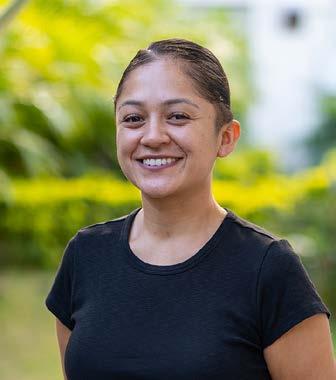
DOMINIQUE BOCANEGRA ’13
How did your education at Chaminade University of Honolulu contribute to your professional success?
My time at Chaminade exposed me to a global community, fostering cross-cultural communication and understanding. Engaging with peers from various backgrounds enhanced my adaptability and broadened my perspectives—essential skills in today’s interconnected professional landscape.
Can you recall a specific moment or experience during your time that had a significant impact on you, either academically or socially?
The most significant experience at Chaminade was my time at the Awakening Retreat # 25 – L.O.V.E. [Lord of Victory Everlasting] led by Demyla Rodriguez and Angel Orozco. All I can say is, “IYKYK and if you don’t, give it a try.”
How did your Chaminade education shape your perspective and personal growth?
Embracing diversity not only enriched my personal growth, but it also equipped me with the ability to collaborate effectively in a multicultural environment, a valuable asset in navigating the complexities of the global workforce.
28 | CHAMINADE MAGAZINE
SHANLYN PARK ’91 NAMED AS DISTRICT COURT JUDGE

The District of Hawai‘i now has its first Native Hawaiian woman to serve on the federal bench as a district court judge. Shanlyn Park ’91 previously served as a Hawai‘i state court judge and former federal public defender. In a bipartisan U.S. Senate vote on November 30, Shanlyn Park ’91 was confirmed as the first Native Hawaiian woman to serve on the federal bench as a district court judge.
“Judge Park’s unique combination of experience, tenacity and genuine kindness will be a huge asset to the federal bench,” said Chief U.S. District Judge Derrick K. Watson in a released statement. “We are excited to have her join us as our colleague in 2024.”
Park was confirmed on a bipartisan vote of 53-45. The lifetime appointment is particularly significant in terms of representation as Native Hawaiians comprise 21.8 percent of the population in the district where she will preside.
Born and raised in Hawai‘i, Park has been a state circuit court judge since 2021. She previously worked in private practice and at the Office of the Federal Public Defender for the District of Hawai‘i. While a practicing attorney, she has also represented individuals on a pro bono basis, including cases of employee discrimination. In a joint statement, U.S. Sen. Brian Schatz and U.S. Sen. Mazie Hirono applauded Park’s confirmation, saying she “led a distinguished career dedicated to public service.”
“She has exhibited a commitment to justice, fairness and impartiality throughout her career, and is highly qualified to serve on the U.S. District Court,” the senators said. “As the first Native Hawaiian woman to serve as a federal district court judge, Judge Park’s confirmation reflects the BidenHarris Administration’s commitment to building a federal judiciary that reflects the diversity of our communities.”
“I love the sense of community that Chaminade provides its students.”
Sean-Zacharry Lorenzo, Jr. ‘24 CHEMISTRY MAJOR, SCHOLARSHIP RECIPIENT
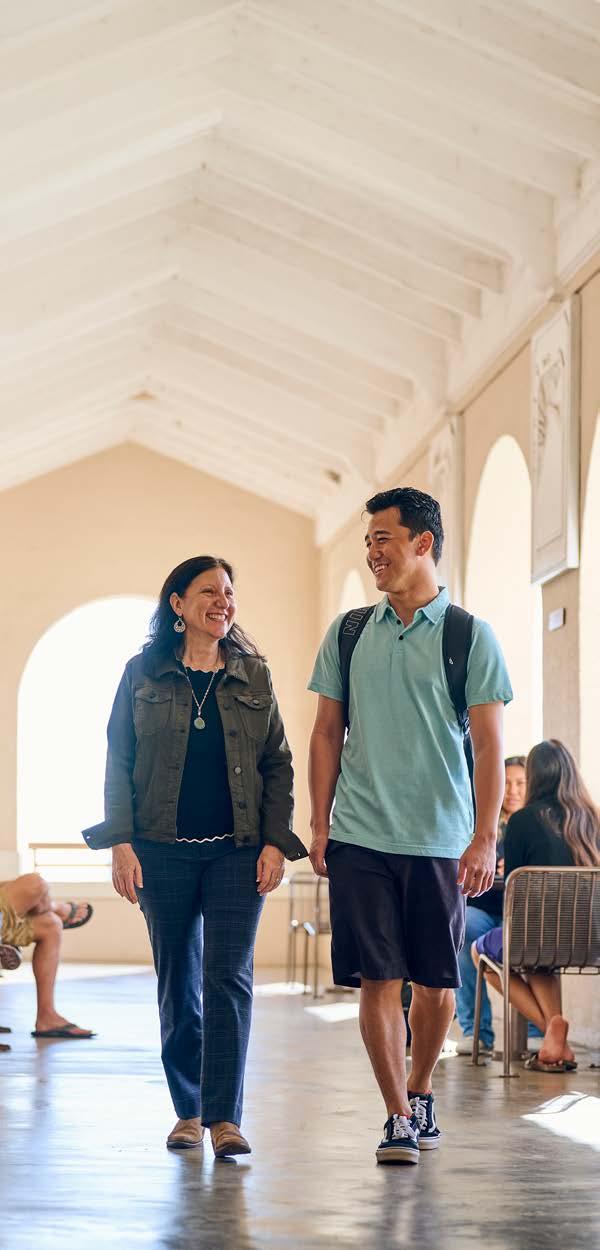
The Chaminade Fund provides students with exciting opportunities and transformative experiences so they may achieve their dreams and reach their potential. Help support our students by making a gift to the Chaminade Fund today.
To make a gift or for more information, go to chaminade.edu/give or contact Kendra Sia, Director of Annual Fund, at (808) 739-8526 or kendra.sia@chaminade.edu.
CHANGE MAKERS
ARTIFICIAL INTELLIGENCE:
EMBRACING THE USE OF AI IN EDUCATION
BY SIMPLICIO PARAGAS

Long before it was reduced to an uppercase two-letter acronym, artificial intelligence (AI) was already present in education with early systems focused on using simple algorithms to automate certain educational tasks. In the 1970s, the emergence of Intelligent Tutoring Systems (ITS) was designed to provide personalized instruction based on individual student needs, more commonly known today as Individual Educational Plans. These days, OpenAI dominates the conversation and headlines.
“AI has been in education in some iteration for decades now,” says Denise Dugan, Ph.D., Assistant Professor of Special Education and Elementary Education. “The danger of AI these days is that current students have too much reliance on it, rather than simply using it as another available resource.”
In an op-ed to the Chicago Tribune, Chaminade Provost Lance Askildson, Ph.D. opines that recent advances in artificial intelligence have given rise to hyperbolic predictions of the decline of many human roles and professions.
“In fact, purported AI platforms such as ChatGPT will never be meaningful replacements for writers, educators or people in general,” Askildson writes. “To understand why this is true, it is critical to remind ourselves of what ChatGPT is and how its architecture and capabilities relate to the science of human learning and the arts of writing and teaching, respectively.”
The conversation around AI didn’t just begin in 2023. The U.S. Department of Education initiated a project exploring the use of generative AI in 2020, partnering with Digital Promise to collect information and insights. Recently, the outcomes of that work were released by the U.S. Department of Education Office of Educational Technology. Titled “Artificial Intelligence and the Future of Teaching and Learning: Insights and Recommendations,” the new report addresses the clear need for sharing knowledge, engaging educators, and refining technology plans and policies for artificial intelligence (AI) use in education.
The report further describes AI as a rapidlyadvancing set of technologies for recognizing patterns in data and automating actions, and guides educators in understanding what these emerging technologies can do to advance educational goals—while evaluating and limiting key risks. This paper also explains AI in education and gives a pros-and-cons summary, and suggests districts develop a policy defining parameters for AI use in education.
During an educator workshop hosted by Hawaii Education Association, Dugan and Chaminade students Abigail Eli ’23 Gabe Zapata-Berrios ’24 were among the attendees who discussed not only the ethical dimensions of AI, but also its legal ramifications.
“I can see how AI is having an impact on educators and students,” says Eli, who is pursuing her master’s
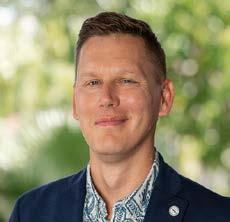
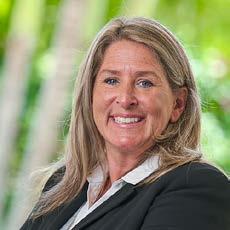
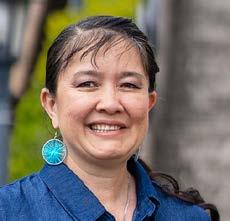
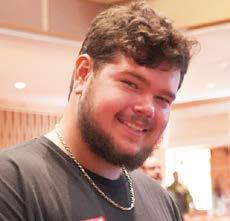 Abigail Eli ’23
Chaminade Graduate Student
Lance Askildson, Ph.D. Chaminade Provost
Gabe Zapata-Berrios ’24 Chaminade Student
Denise Dugan, Ph.D. Assistant Professor of Special Education and Elementary Education
Abigail Eli ’23
Chaminade Graduate Student
Lance Askildson, Ph.D. Chaminade Provost
Gabe Zapata-Berrios ’24 Chaminade Student
Denise Dugan, Ph.D. Assistant Professor of Special Education and Elementary Education
30 | CHAMINADE MAGAZINE
in counseling psychology at Chaminade and is one of three Community Homeless Concerns liaisons with the Hawai‘i Department of Education in the Nānākuli–Wai‘anae Complex Area. “I think it could be beneficial for our Wai‘anae students who struggle with the concept of writing. I think they can learn from seeing something that’s well written.”
Starting his student teaching in Kailua, Zapata-Berrios has experimented with AI in his own studies, using it, for example, to create lesson plans, which typically take a lot of time.
“AI will write a complete lesson plan in less than 10 seconds,” Zapata-Berrios says. “This lesson plan is typically pretty good as a first draft. If I want I can ask the AI to revise it for me or I can just take that draft and revise it myself. I would always recommend revising it yourself because AI is not perfect.”
While academic dishonesty tops the list of educators’ concerns about AI in education, teachers also worry that increased use of AI may mean learners receive less human contact. It’s a valid point that Askildson succinctly affirms in his letter to the editor noting, “The science of human learning has shown us that students learn not only through their abilities of reasoning, interpretation and creative expression—which ChatGPT lacks— but also with the help of teachers who engage them in a two-way dialogue accompanied by feedback that is adjusted to their understanding and overall needs.”
From a student’s perspective, the use of AI in education comes with both benefits and potential pitfalls. Some view AI-powered tools as a way to provide additional support to students with diverse learning abilities, making education more inclusive. It can then assist in addressing specific challenges students may face.
Others are skeptical about its accuracy and its susceptibility to spread misinformation and disinformation. It’s also biased since AI can only be as smart or effective as the quality of data it is provided, and algorithms can be manipulated and skewed.
“Some of the teachers we heard from said they wanted to stay away from AI altogether, that it was too controversial,” Dugan says. “They were afraid of plagiarism and cheating, and not being able to detect it. But I say AI is here to stay; it’s not going to go away and it will only progress over time.”
“AI is going to keep growing and infiltrating more parts of our lives,” adds Zapata-Berrios. “It’s already all over the place and constantly analyzing and improving. It will become more prevalent in classrooms, however, I don’t think it will become something that the students use to outsource their thinking. I think it’ll be present without the students knowing it’s there.”
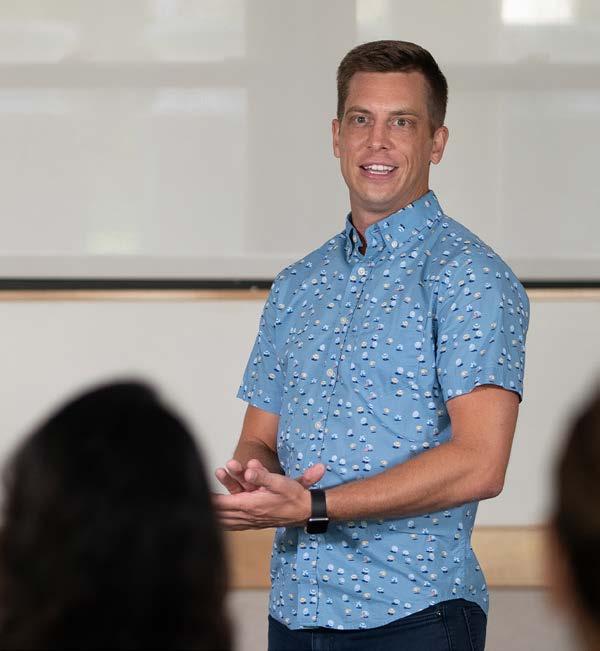
ENRICH YOUR LIFE. FURTHER YOUR EDUCATION. EARN A GRADUATE DEGREE FROM YOUR ALMA MATER!
Chaminade offers programs that make an impact.
MASTER’S PROGRAMS
Master of Arts in Teaching
Master of Business Administration and One Year MBA
Master of Education
Master of Pastoral Theology
Master of Science in Criminal Justice Studies
Master of Science in Counseling Psychology
SPECIALIST PROGRAM
Education Specialist in School Psychology (EdS)
DOCTORAL PROGRAMS
Doctor of Education in Educational Psychology (EdD)
Doctor of Education in Organizational Leadership for Adaptation and Change (EdD)
Doctor of Marriage and Family Therapy (DMFT)
Doctor of Nursing Practice (DNP)
Doctor of Psychology in Clinical Psychology (PsyD)
OFFICE OF ADMISSIONS
CLARENCE T.C. CHING HALL | (808) 739-8340 GRADUATE@CHAMINADE.EDU
BRAVO! AWARDS
Presented to Outstanding Silverswords
Lei, cheers, toasts and lots of hugs were exchanged at the Silversword Reunion dinner on October 14 as three alumni were recognized for their outstanding achievements and contributions to the community and to Chaminade University.
Congratulations to all alumni who were nominated and to the award recipients, who exemplify the values of faith, service and aloha—characteristics of a Marianist education.

KAHALA KABALIS HOKE ’05, MS’07
Recipient of the MARIANIST AWARD for exemplifying the Marianist spirit
ABOVE: Athletic Director Dr. Tom Buning, Vice President of Advancement Jill Higashi and Women’s Volleyball Head Coach Kahala Kabalis Hoke ’05, MS '07 pictured at the Silverswords Gala on February 24.
FACING PAGE: Emcee Brook Lee ‘96, Dr. Thomas Shieh ‘87, Dr. Lynn Babington, Lei U‘i Kaholokula ‘23, and Bro. Ed Brink.
A true community leader and service-minded alumna, Kahala Kabalis Hoke is in her 12th year as head coach of the Chaminade University women’s volleyball team and also heads the beach volleyball program. Kabalis Hoke has captured two Pacific West Conference titles with four 20-win seasons, three postseason berths since 2018, and PacWest Coach of the Year honors in 2021 and 2022, and the AVCA West Region Coach of the Year in 2021. She is also the NCAA Diversity, Equity, and Inclusion designee for Chaminade University and serves as advisor to two student organizations. She graduated cum laude with a Bachelor’s of Science in Criminal Justice and earned a Master’s degree in 2007 in Criminal Justice Administration from Chaminade. She also gives back to the community by serving local youth. She led the HI Intensity Volleyball Club from 2006 to 2022. In her spare time, she coaches for the youth club Ka Ulukoa Volleyball Institute. She and her husband, David Hoke, have a son, Kia‘ikaiola.
32 | CHAMINADE MAGAZINE


DR. THOMAS SHIEH ’87
Recipient of the DISTINGUISHED ALUMNI AWARD for making distinguished and outstanding contributions to his profession and the community
Dr. Thomas Shieh ’87 is a respected obstetrician and gynecologist who arrived on Guam as a Navy Medical Officer in the U.S. Naval Hospital after his ob-gyn residency training from the University of Hawai‘i John A. Burns Ob-Gyn Residency Program at the Kapi‘olani Medical Center for Women & Children. He has been practicing on Guam for more than 23 years, and owns and operates a clinic for women. For the past 25 years, he has funded Guam’s best student-athletes with the Shieh Su Ying Scholar-Athlete award, named after his grandmother. He also helped to establish the Henry Gomes Endowment and the Merv Lopes Scholarship at Chaminade. He and his wife Raven have two daughters and a grandson.
LEI U‘I KAHOLOKULA ’23
Recipient of YOUNG ALUMNI AWARD for excellence in her field and demonstrated service to community, the university and the public.
Lei U‘i Kaholokula ’23 began her on-air career joining the KITV4 Island News team in 2014 and is now a news anchor. Last year, Kaholokula was part of ABC’s AANHPI (Asian American Native Hawaiian Pacific Islander) network broadcast which brought inclusive storytelling to Hawai‘i that amplified Native Hawaiian voices to a national audience. Kaholokula was born and raised on The Garden Isle where she graduated as a Kapa‘a High School Warrior in 2009. She attended Chaminade University under academic and athletic scholarships, and competed in pageants, holding titles at the local, state and national level through the Miss Hawai‘i/ America system. Her father, Robbie Kaholokula, is a Nā Hōkū Hanohano Award winner. Her mother, Pua, is a kumu hula, and her brother Baron is a singer and songwriter. She enjoys spending time with her husband Kaha‘i and their children.
WATCH THESE TRIBUTE VIDEOS TO EACH AWARD RECIPIENT.
Lei U’i Kaholokula ‘23
Dr. Thomas Shieh ‘87
INSPIRATIONS | 33
Kahala Kabalis Hoke ’05, MS '07
CHAMINADE HALL OF FAME
Inducts Two New Members

THE THRILL AND PRIDE THAT COMES WITH WEARING A SILVERSWORD ATHLETIC UNIFORM ON THE COURT WAS REVISITED AS TWO ATHLETES-TURNEDCOACHES WERE INDUCTED INTO THE CHAMINADE HALL OF FAME ON FEBRUARY 24. CONGRATULATIONS TO THE FOLLOWING SILVERSWORDS!
THOMAS "CHICO" FURTADO ’80
LEFT: Pictured at the Silversword Gala were Director of Athletics
Tom Buning, Thomas "Chico" Furtadoʻ’80, Terri (Bertulfo) Chong ’92 and Dr. Lynn Babington.
Thomas "Chico" Furtado ’80 was a stellar Silversword basketball star who played on teams coached by the legendary Merv Lopes in the late 1970s. He was a talented and fiery hard-nosed basketball player at Chaminade and during his high school years at ‘Iolani School. He has successfully coached high school boys and girls basketball, and won numerous state championships. Chico is a member of the Chaminade 1,000-Point Club, scoring an amazing 1,015 points from 1976-80. He still ranks as the third best all-time assists leader with a 486 total and second all-time with an average of 5.8 assists per game. Chico currently coaches basketball at Maryknoll High School.
TERRI (BERTULFO) CHONG ’92
Terri (Bertulfo) Chong ’92 ranks as Chaminade Volleyball's all-time career kills leader and in the top ten in three other statistics. An avid athlete, she was awarded a five-year volleyball scholarship at Chaminade University where she earned a business degree and went on to work for Title Guaranty Escrow for more than 20 years. She began as an escrow assistant and was eventually promoted to escrow officer and soon after as a branch manager. Terri is married and has three daughters. Her daughter, Kaya Chong, also played for Chaminade from 2013-2015. She enjoys spending time with family and volunteering as a volleyball coach.
34 | CHAMINADE MAGAZINE

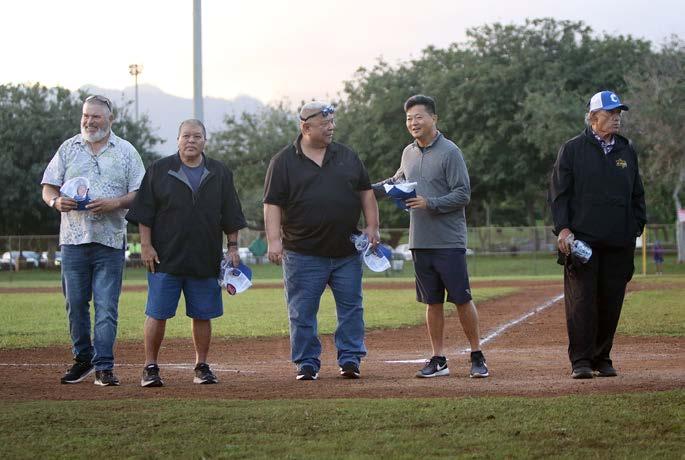
PLAY BALL!
In 1980 under coach Leroy Goo, Chaminade’s baseball program played in an official NAIA season of competition. It remained as a club team in 1981 before it was canceled. This year, baseball is back. In the program’s new life, it competes in the NCAA Division II league and member of the PacWest Conference, like the rest of the Silverswords’ sports teams. In early February, a ceremonial first pitch at Patsy T. Mink Central Oahu Regional Park was thrown out and recognition was given to attending members of the program from its past. They included then-assistant Kala Kaaihue, and players Joe Arakaki, Billy Duhay, Rankin Kaanoi, Carlton Keyes, Kyle Tengan, Peter Tuohy, Terry Derby and Ivan Loughmiller, the last of whom was represented by his wife, Leora.
ABOVE: Members of the early baseball teams showed support for the current student-athletes.

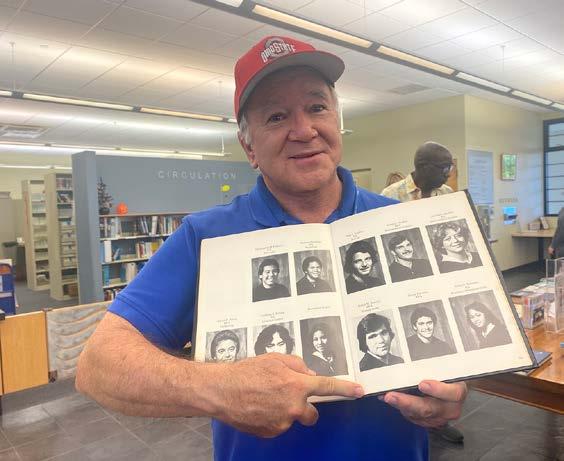
EVERY SILVERSWORD HAS A STORY, AND WE WANT TO HEAR YOURS!
Chaminade University is partnering with PCI (also known as Publishing Concepts) to produce the Silversword Stories oral history publication for the University. PCI is a family-owned business based in Dallas, TX, that has published directories for educational institutions across the nation for nearly 100 years. The project will allow alumni to update their information and share personal experiences and memories of their time at Chaminade.
When you receive a postcard or email from PCI, please know that this is a sanctioned partnership with Chaminade. If you have any questions, contact Jodi-Anne Yoshida, Director of Alumni Relations, at alumni@chaminade.edu. Mahalo.
CHANGE MAKERS | 35
WHY CLASS NOTES?
As you embark on your life path, your alma mater encourages you to share your achievements, experiences, and perspectives while also staying informed about current developments at Chaminade and your respective programs.
Staying connected with Chaminade helps build a strong sense of community and belonging, and serves as a pathway for you to explore mentorships, volunteer opportunities, or provide scholarship or program support.
I look forward to building our class notes together! Mahalo,
Jodi-Anne Yoshida Director of Alumni Relations
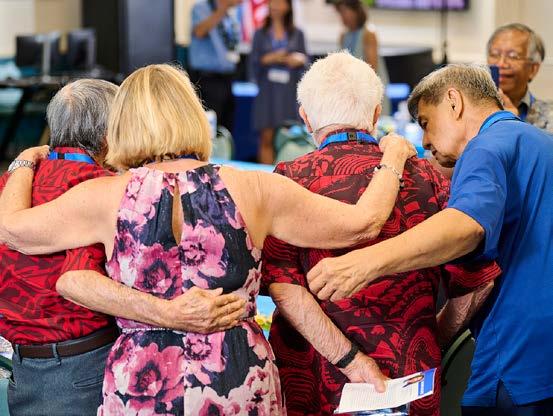




36 | CHAMINADE MAGAZINE


Silversword Reunion:
ONE FOR THE AGES
Whether referred to as a silversword or as ‘āhinahina, this rare plant that grows high atop Haleakalā on Maui is the symbol of perseverance, pride and promise. Those qualities resonated among attendees of the momentous Silversword Reunion in October.
Generations returned to Kalaepōhaku for four different reunion events, each reconnecting and engaging Chaminade University graduates with their beloved alma mater. Satisfaction was achieved beyond expectations.
“As you gather with your fellow Silverswords, we hope you are rekindling friendships, sharing cherished memories, and creating new connections,” said President Lynn Babington. “You can continue to be proud of your alma mater and how Chaminade has flourished.”
BACK TO SCHOOL
Reunion Week kicked off on October 12, with an early evening tailgate party at Henry Hall Courtyard. Director of Alumni Relations Jodi-Anne Yoshida, M.B.A. ’23 welcomed guests, whose graduating years ranged from the 1960s to 2023. Alumni received Chaminade t-shirts and blue pom poms while enjoying a delicious dinner of BBQ chicken, kiawe-smoked pork chops, greens and more. Following the tailgate, the party was moved inside to McCabe Gymnasium to cheer on the Chaminade women’s volleyball team. The Silverswords swept the HPU Sharks!
Then, on Aloha Friday, October 13, alumni returned to campus for tours and an ono bento lunch. Students Aleeyah Lemons ’24 and Noelani Tugaoen ’25 guided alumni on walking tours, strolling along Second Road, past Ching Hall and
Eiben Hall, into the Sullivan Family Library and back to Henry Hall, where President Babington greeted them with her warmth and aloha. In the library, alumni perused past yearbooks and were amused to find their student photos. They recalled that the library was once housed in Henry Hall as they shared heartfelt stories from their college days.
SPECIAL REUNION DINNER, ALUMNI AWARDS AND MASS
The long-anticipated reunion dinner was a great success, as nearly 300 alumni and guests gathered in the Ching Conference Center on October 14. Emceed by former Miss Universe Brook Lee ’96, the program opened with a blessing from Bro. Ed Brink, followed by the presentation of Alumni Awards. Lee brought her charisma and sparkle to the program, which featured music by Nick La‘a and DJ Sounds by Pipi.
The following morning, a Sunday Mass was held as alumni gathered in the sacred Mystical Rose Oratory to celebrate faith, hope and love.
Enjoy this reunion recap video.
CLASS NOTES | 37
1970s
Drs. Michael ’79 and Sally Coovert sported their Chaminade University gear on a morning walk in Fort Walton Beach, Florida.

The Class of 1971 came together for its annual lunch gathering in February 2023. Thanks to Bro. Dennis Schmitz, S.M. for sharing the photo.
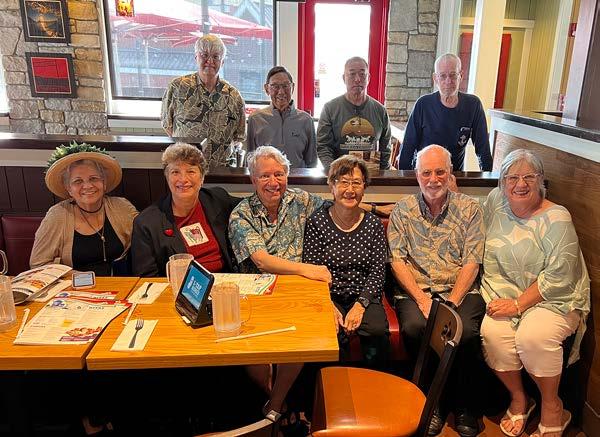
ALUMNI CLASS NOTES
1980s
After traveling the U.S. for a year and a half, staying in Airbnbs and VRBOs, Patrick Butler ’86 and wife Katrina decided "At my age, I need a place with all my things about me!" He also wrote: “On the last day before he booked a month-long adventure in Portugal, the Creator brought us to the perfect home on the golf course. We even have a visiting alligator in the Perdido area of Pensacola, Florida. Locals who follow the sun will understand the one key factor of living in Northern Florida—the sun is in front of you all day, not like Miami where it goes back over the beach or Malibu where you only get afternoon/evening sun. The other thing about Florida is Disney World annual passes, plenty of fun to enjoy there. Finally I am bullish on crypto and have purchased the crypto domain ‘silversword.’”

Estela Tabangcura Derr
’88 is a proud Chaminade alumna and retired warden of the Federal Bureau of Prisons (BOP). She wrote: “My unconventional 33 year federal service career path allowed me to travel to and live in five different states (Pennsylvania, Hawai‘i, California, Arizona, Washington). My federal service began with a four year stint at Hickam Air Force Base from 1988-1992 as a Management Analyst (Palace Acquire) Intern—a lead found through Chaminade’s career center.” After her years of service, she retired in October 2023. In December 2023, she was honored by the American Society for Public Administration, Hawai'i Chapter for Outstanding Public Service.
1990s
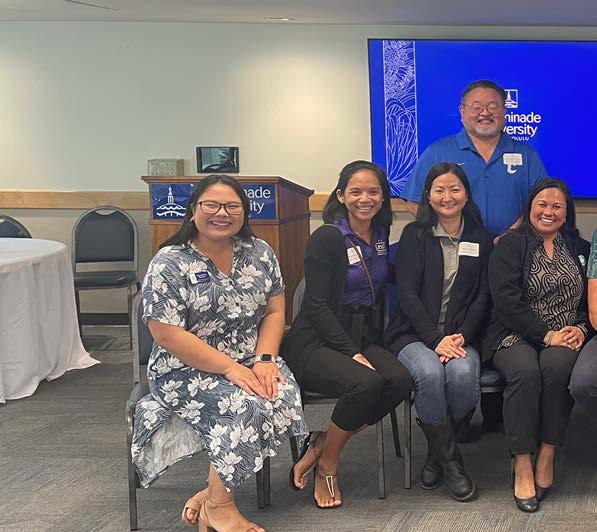
38 | CHAMINADE MAGAZINE
2000s
Tobias Boehm ’00 earned an MBA degree from the University of Illinois Gies School of Business and plans to use it along with his extensive dental training and experience as periodontist and dental educator to build a network of non-profit dental clinics, including helping underserved populations of Southern California.

T. Nichelle Inman ’01 celebrated her 50th year as a registered Girl Scout and was awarded a Girl Scout appreciation pin for many hours of volunteer service. She is also a Kiwanis member and was just nominated and elected as president-elect from the 2023-2024 term year.
Sara Wiger '03 finished her Ph.D. at Oregon State University in education and completed her dissertation looking at the implementation of dyslexia policy by teachers.
Maui County Mayor Richard Bissen has appointed Patrick McCall MEd ’05 and Shane Dudoit to serve as director and deputy director, respectively, of the Department of Parks and Recreation. McCall is a former middle school athletics coordinator for Kamehameha Schools Maui and athletic director and dean of students for St. Anthony Junior and Senior High Schools. He also served as vice principal of King Kekaulike High School. He has been a fourth grade teacher at Kula Elementary School since 2017, where he co-founded the after-school agriculture program at Keokea and teaches Hawaiian culture and history as part of the curriculum. From 1998 to 2001,
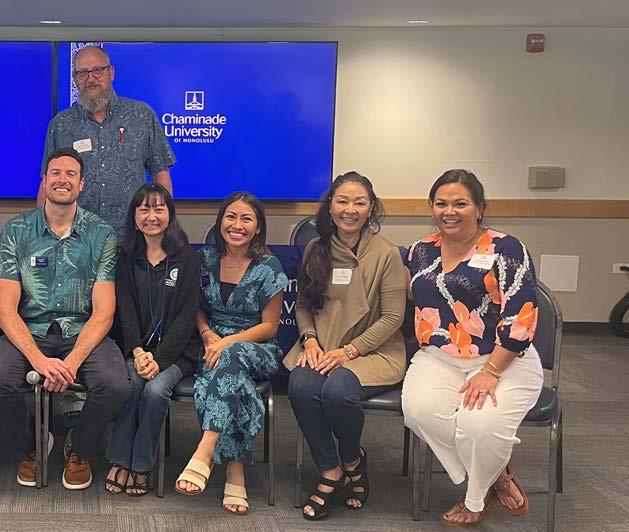
McCall was the Hawai‘i High School Athletic Association’s statewide coordinator for cross country and co-coordinator for track and field. McCall earned his Bachelor of Science in Biology degree from Gonzaga University and a Master of Education from Chaminade.
Chaminade graduates at Nānākuli High and Intermediate school work as counselors to proudly serve students and community.


Vanessa (Cabilan) Lariosa, MS ’20; Raemie Pagaduan, MS ’07; Debra Yamakawa MS ’05; Angel Decierdo, MS ’20 and Jacqueline Smith, MS ’18
LEFT: Chaminade graduates who are now community college counselors were invited back to campus by the Enrollment Management office for an informational meeting which also became a great reunion.
Hilary Arakaki, MS ’19 and Stacy Koyama, MS ’16
CLASS NOTES | 39
Forrest Wells, MSCP ’08 developed an intensive outpatient mental health treatment program for adolescents, helped on Maui following the fire, managing counseling services at The Queen's Medical Center. He has also applied to the One Year MBA program at Chaminade.
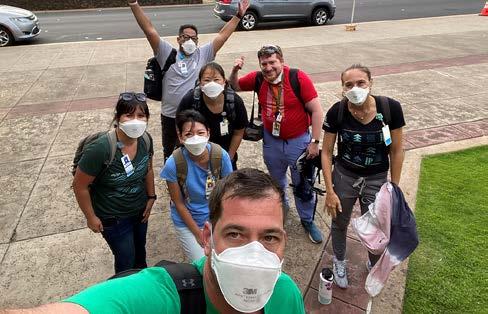
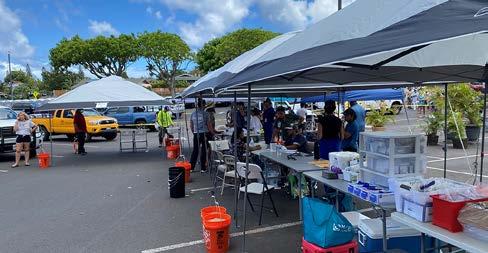
Forrest Wells, MSCP ’08 is working to provide counseling services.
Blaze Mancillas ’09 shot his first short film "Friuli" as writer and director. It is about his grandmother who was a teenager on a farm in Northern Italy in 1943 when her home was occupied by Nazi soldiers. He hopes to submit the film to festivals when finished. He is grateful for his time participating in the performing arts at Chaminade and for professors like Bro. Gary Morris, Tim Carney and Fr. Bob Bouffier.
2010s
The Honolulu Star-Advertiser featured Tina Andrade BS ’05, MPT ’14 as the new COO of Catholic Charities Hawaii to oversee the organization’s day-to-day operations, including housing assistance, among other services.
ALUMNI
CLASS NOTES
Christina Sommer ’15 shared that In the past, her view of finding a career was set on a linear path and that now she sees that there are curves, hills, and pauses/ breaks along the way. With that, she wants to thank the National Academy of Sports Medicine (NASM) for creating such flexible courses! She can add Certified Nutritionist to her resume @FuelologyNutrution. Cheers to new opportunities!

Five years from the day they met, Waelchi Shon Kruse ’17 married sweetheart Colin in Las Vegas. They had a small wedding with their closest family members. The day was perfect and they plan on honeymooning on an Alaskan cruise next fall.
Lynsey Bow BA '08; MSCP '12 has been promoted to Counseling & Advising Program Director at University of Hawai‘i System - Hawai‘i P-20 Partnerships for Education.
Soon after graduation, Shaunte Sadora, MSCP ’14 started in higher education in the Student Counseling Office as a tenured Academic Counselor at Kaua‘i Community College.
2020s
Bess Elliott Pascarelli, MBA ’22 is currently working full time in the DoD in a management position, founded a business called “Aclypsa” and is currently launching an app in the wellness space, to connect users with other people of similar interests.
A mini Silversword reunion happened in Washington, D.C.. Melissa Ann Camuti, MEd ’13, Bennett Romeo ’19 and Rachel Arakawa ’20 recently met with President Lynn Babington for a great conversation and eats this past February.

40 | CHAMINADE MAGAZINE
Returning to campus as part of the Accelerator Films team to create a video for the university were Mark Ganialongo ’99, Sound Recordist, and Mardi Savage ’10, Producer.

Submit Your Class Notes*
Please be sure to share your good news with the Chaminade community and include the following:
• FULL NAME, GRADUATION YEAR and MAJOR (include maiden name and spouse’s name, if applicable)
• CONTACT INFORMATION (phone number and email)
• PHOTOS are encouraged (high resolution preferred: 300 dpi or 1.5 MB in size)
< SCAN THE QR CODE and complete our online form
EMAIL: alumni@chaminade.edu
Or MAIL : Office of Alumni Relations 3140 Wai'alae Avenue Honolulu, Hawai'i 96816
*All notes are edited for style, content and length.
Stay Connected
@cuhalumni @chaminade-university-alumni alumni@chaminade.edu chaminade.edu/alumni
In Memoriam
Chaminade University extends heartfelt sympathy to the family and friends of the recently deceased. These alumni are forever part of our ‘ohana.
The University also strives to maintain accurate records. Please notify us when an alumnus/a has passed away. Emails may be sent to alumni@chaminade.edu. Mahalo.
.
Kalena Kattil-deBrum BS’14 passed away on February 15, 2024. Born on August 9, 1992, to Dolores and Paul Kattil, Kalena was a source of joy and inspiration throughout her life. She is lovingly remembered by her siblings Paul Jr., Keoni, Catherine and Tony Kattil. Kalena was a brilliant mind, earning a B.S. in Environmental Studies from Chaminade University of Honolulu in 2014, and later, an M.S. in Environment and Society, from the University of Waikato - Hamilton Campus in New Zealand in 2019. Kalena was a respected Chief Research Scientist at the Marshall Islands Marine Resource Authority for many years, showcasing her intelligence, dedication and passion for marine and environmental conservation and sustainable living. She was pursuing her Ph.D. in Fisheries Science at the University of Washington during her untimely passing.
CLASS
1967
Martha Lau Lee
1969 Robert Burke, Sr.
1972
Thomas Weld
1973 Michael Clark
1973 Aaron Purtee
1973 David Roy Wheeler
1975 Raymond Sherwood
1975 John Tunison
1976 Larry Ingle
1977 Lee Donohue, Sr.
1977 June Zeplin
1978 Dennis Niederkohr
1979 Steven Caldwell
1983 Frank Charles Capaci
1983 Gwenson Yuen
1984 Gilbert Aldrich
1987 Donald Durbin
1992 Oscar Betham
1996 Richard Rust Thetford
2008 Shaunalei Awong
2009 Mary Snyder
CLASS NOTES | 41
NOTABLES
Lynn Babington, Ph.D. – PRESIDENT
Dr. Babington was recognized as one of Hawai‘i’s Most Admired Leaders by Pacific Business News. She was featured in a series of PBN articles and honored at a dinner on Nov. 9 at the Alohilani Resort Waikiki Beach.
Lance Askildson, Ph.D. – PROVOST AND SENIOR VICE PRESIDENT FOR ACADEMIC AFFAIRS
Dr. Askildson authored the OpEd “Why AI Can Never Replace Writers, Educators or People in General” for the Chicago Tribune last May. On the same topic, he also participated in the panel “AI in the Open” at Shangri La Museum this past March.
Sherry Sutherland-Choy, Ph.D. – SCHOOL OF EDUCATION AND BEHAVIORAL SCIENCES
Dr. Sutherland-Choy received the Hawai‘i Psychological Association Rural and Underserved Community Service Award and Matthew Finelli received the Hawai‘i Psychological Association Student of the Year award.
James Kraus, Ph.D. – SCHOOL OF HUMANITIES, ARTS AND DESIGN
It was poetic that Chaminade English professor James Kraus, Ph.D., was announced as the recipient of this year’s Loretta Petrie Award by the Hawai‘i Literary Arts Council (HLAC). After all, the award’s namesake was an early leader of HLAC, and a teacher and administrator at Chaminade University, where she took an active role in its literary magazine and sustained her own lifelong interest in writing. A legacy that Kraus helps perpetuate today on campus.
Kimberly Kim, MAT ’21
Moanalua Middle School social studies teacher Kimberly Kim was honored with the 2024 state Teacher of Promise award. The award is granted annually by the Milken Educators of Hawai‘i—a select group of Hawai‘i educators who have been recognized by the nationally renowned Milken Family Foundation—to a classroom teacher for demonstrating outstanding commitment and potential during their first three years with the Hawai‘i State Department of Education (HIDOE).


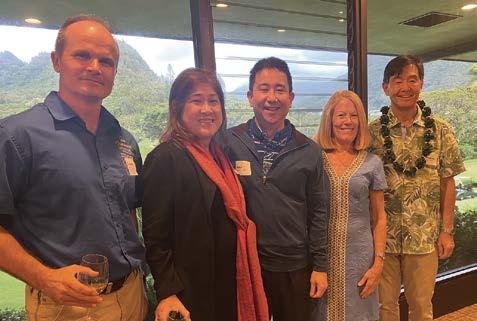

42 | CHAMINADE MAGAZINE
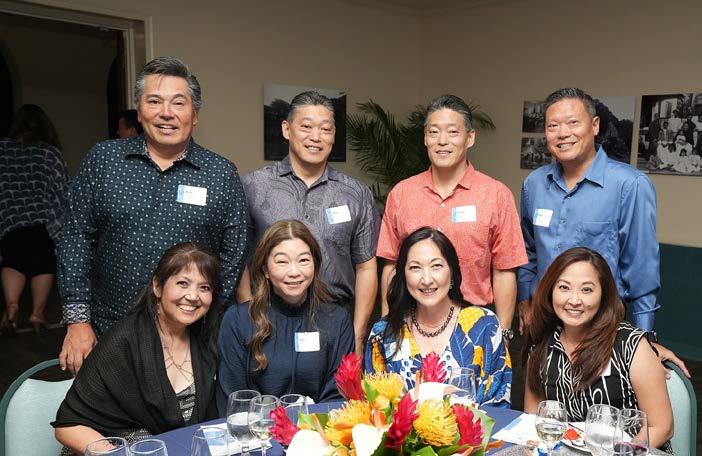

SCENE & HEARD
FESTIVITIES!
In recent months, Chaminade alumni and friends gathered for fun, festive events. The Maui Invitational Aloha Reception, a reunion for MBA graduates, and the Silversword Gala to raise money for scholarships and athletics were just a few of the events bringing alumni and friends back. Be on the lookout for more to come. Go Swords!
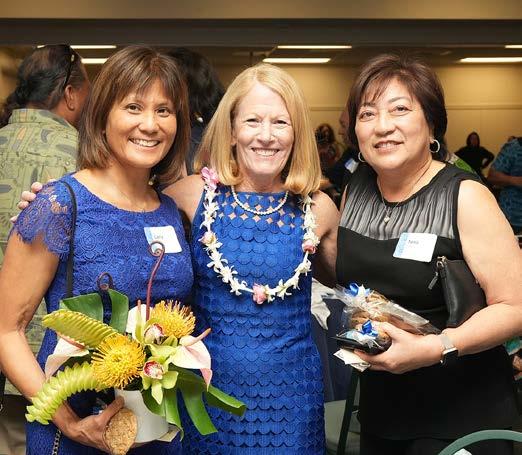
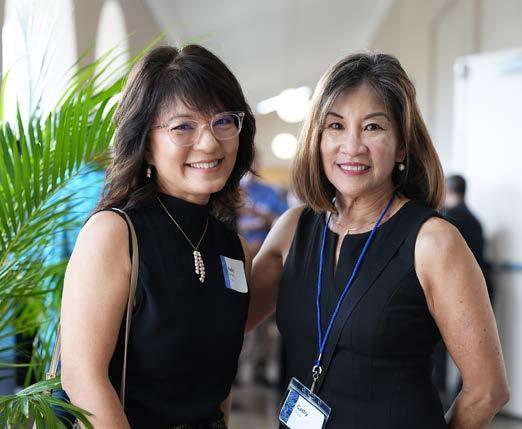

CONNECT WITH US @cuhalumni @chaminade-university-alumni
3140 Wai'alae Avenue
Honolulu, Hawai'i 96816 -1578
CHANGE SERVICE REQUESTED
UPCOMING EVENTS
MAY 3
Baccalaureate Mass
Mystical Rose Oratory
MAY 4
Nursing Pinning Ceremony
Ching Conference Center
MAY 4
Commencement Ceremony
Waikīkī Shell
AUGUST 8
Nonprofit Financial Seminar Chaminade Campus
AUGUST 15 - 18
New Student Orientation
AUGUST 19
Fall Semester Begins
DECEMBER 6
Fall Semester Ends
Chaminade University students, faculty and staff joined the community by participating in the Martin Luther King,
Day parade on Monday, January 15 by walking from Ala

NONPROFIT ORG. U.S. POSTAGE PAID HONOLULU, HI PERMIT NO. 320
Jr.
Moana Beach Park through Waikīkī.













 BELOW: Students from Sacred Hearts Academy toured campus.
BELOW: Students from Sacred Hearts Academy toured campus.








































 Abigail Eli ’23
Chaminade Graduate Student
Lance Askildson, Ph.D. Chaminade Provost
Gabe Zapata-Berrios ’24 Chaminade Student
Denise Dugan, Ph.D. Assistant Professor of Special Education and Elementary Education
Abigail Eli ’23
Chaminade Graduate Student
Lance Askildson, Ph.D. Chaminade Provost
Gabe Zapata-Berrios ’24 Chaminade Student
Denise Dugan, Ph.D. Assistant Professor of Special Education and Elementary Education






































